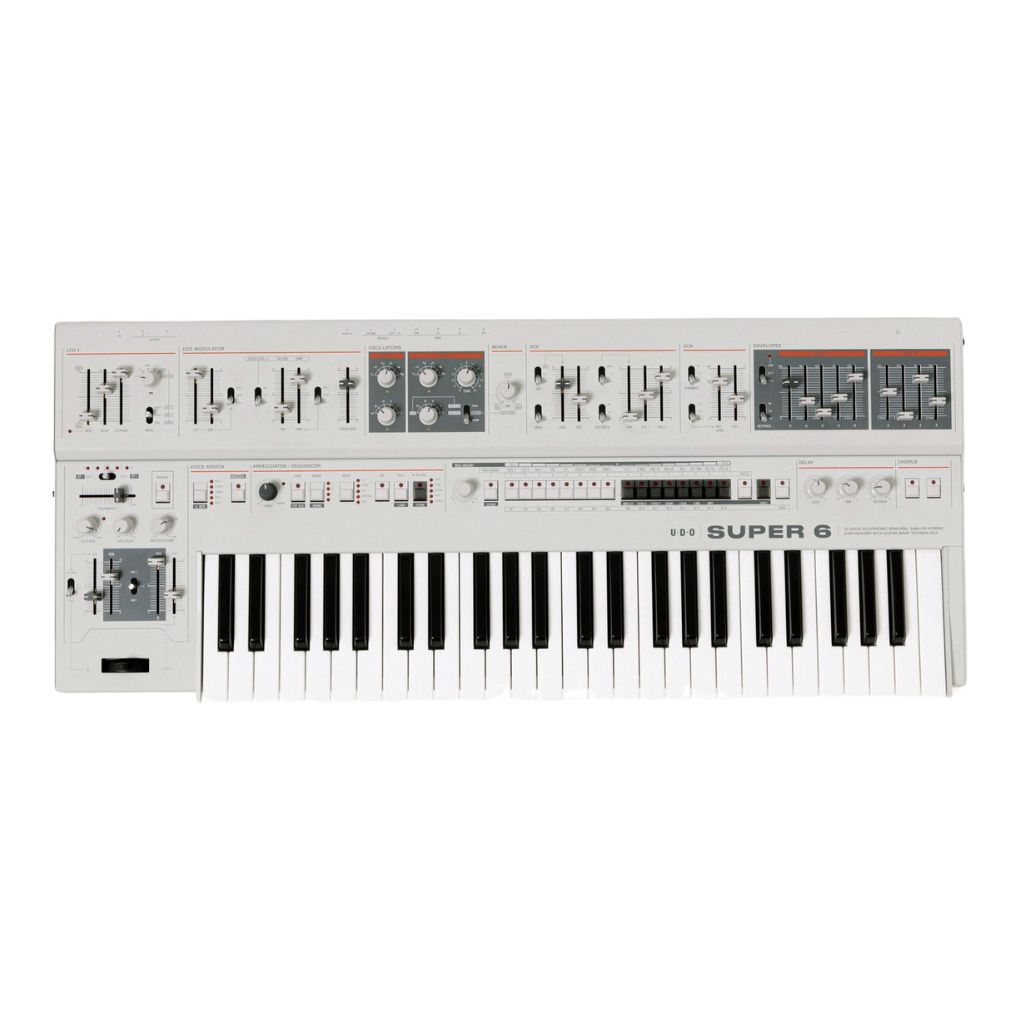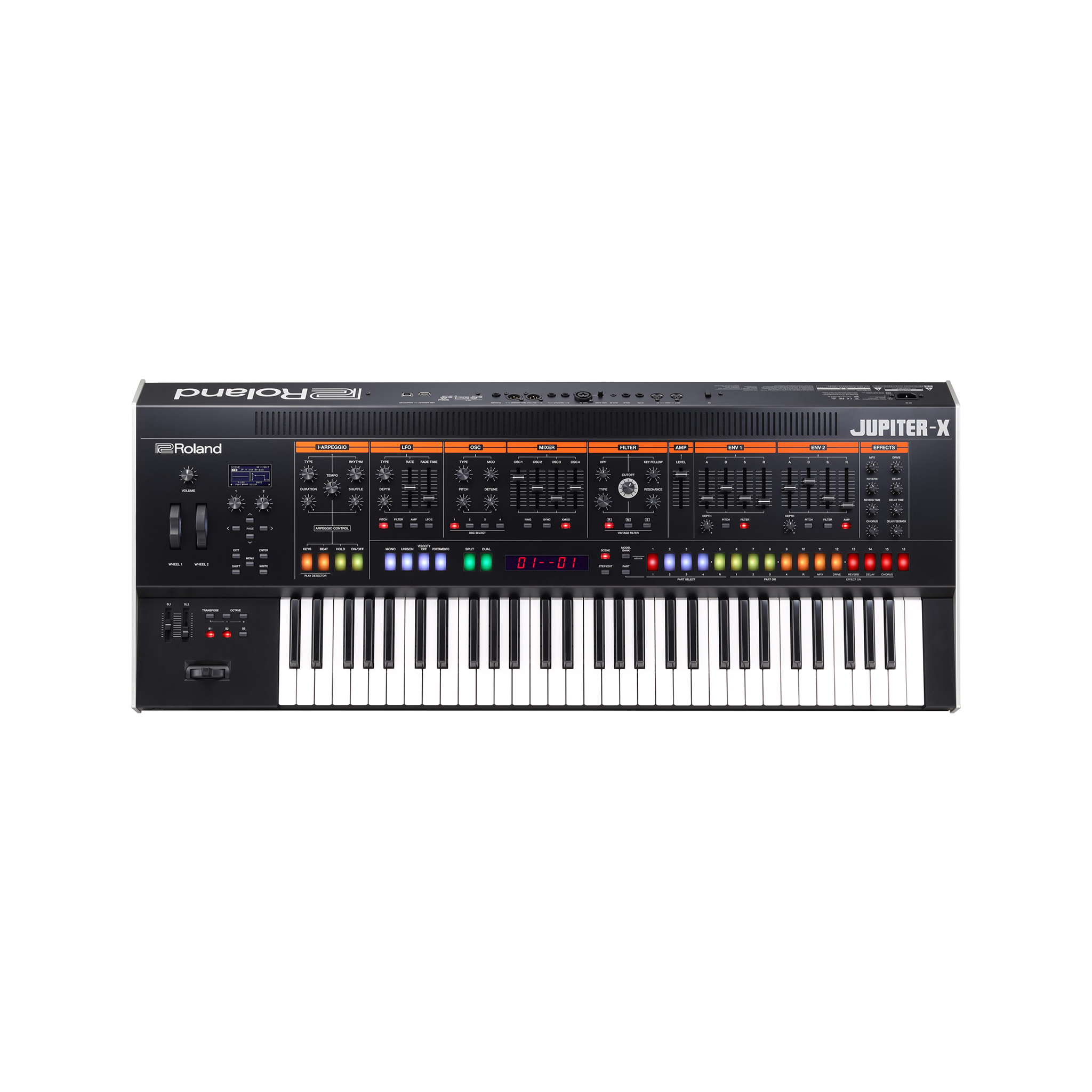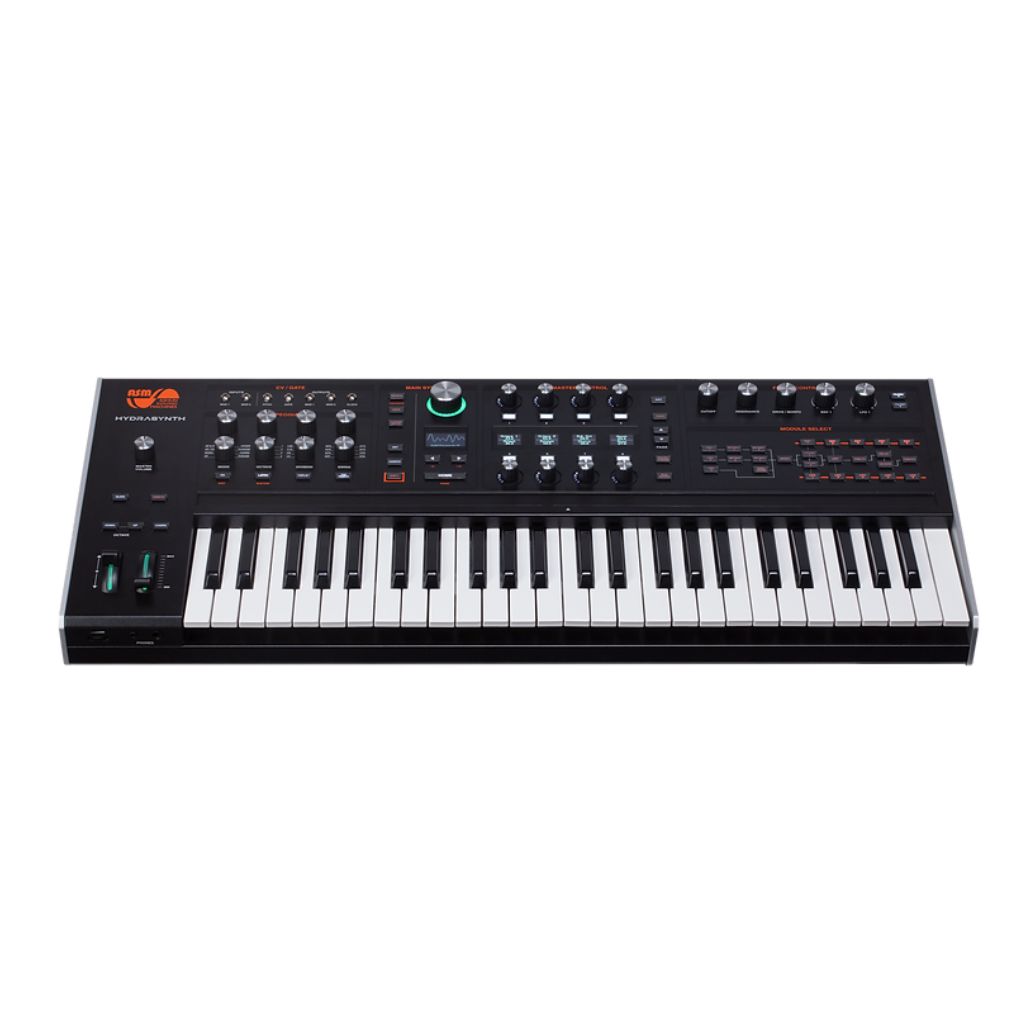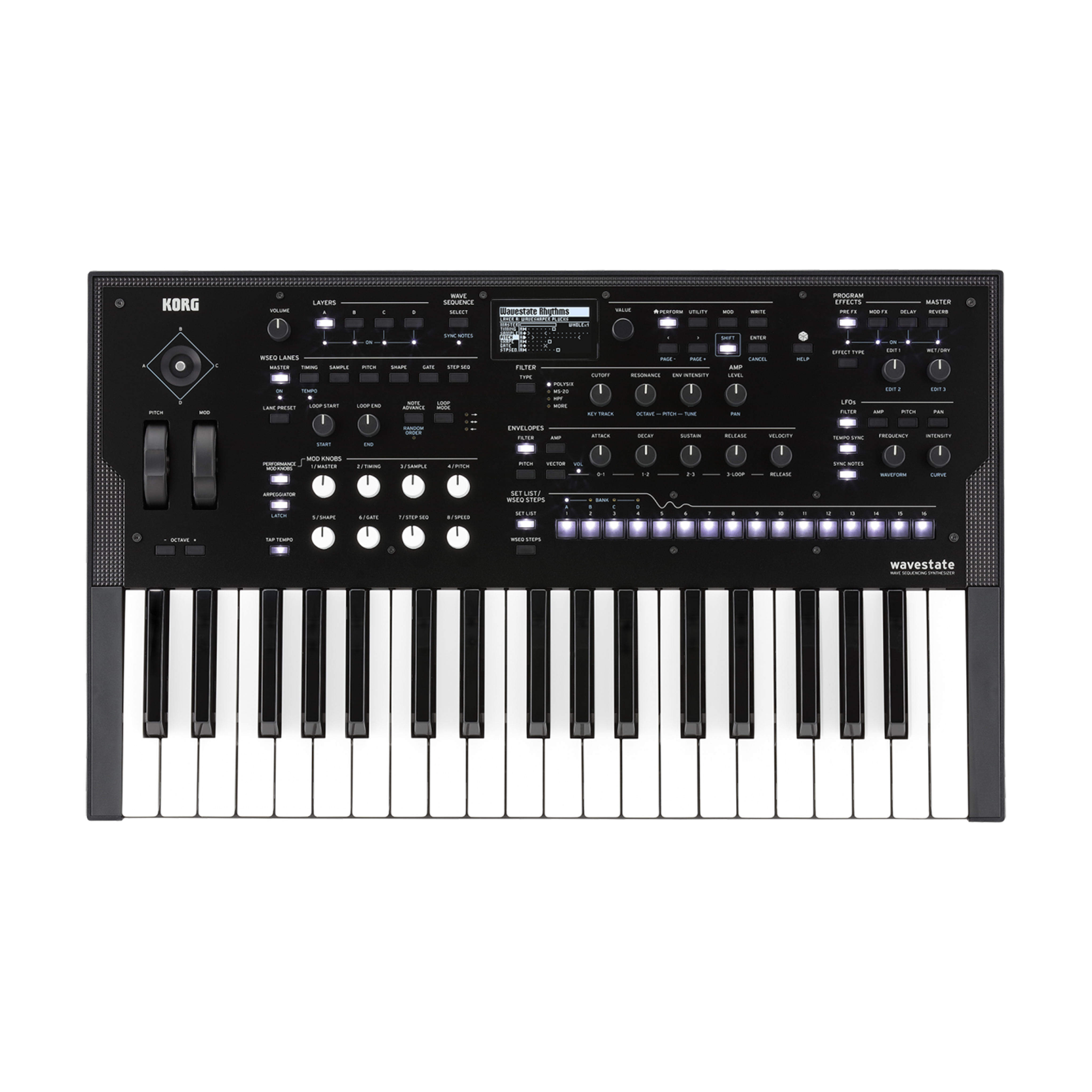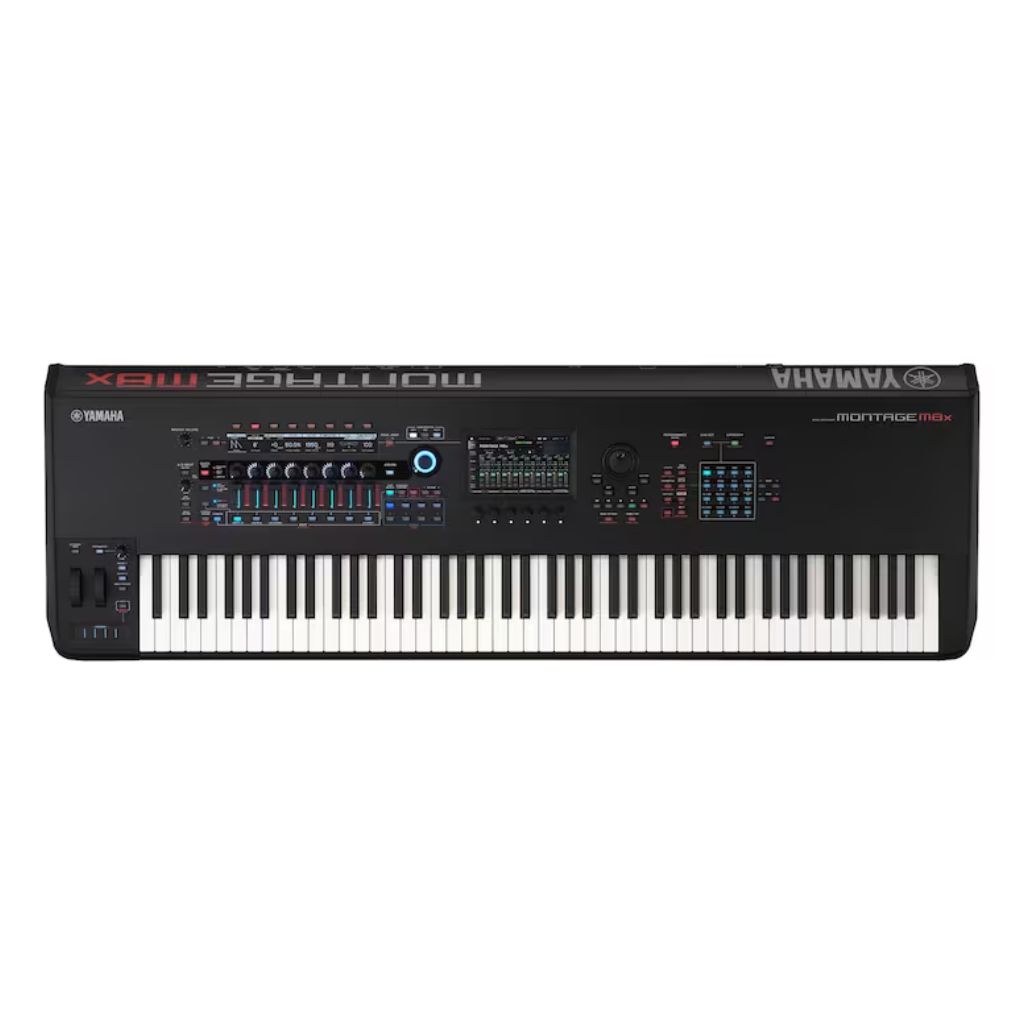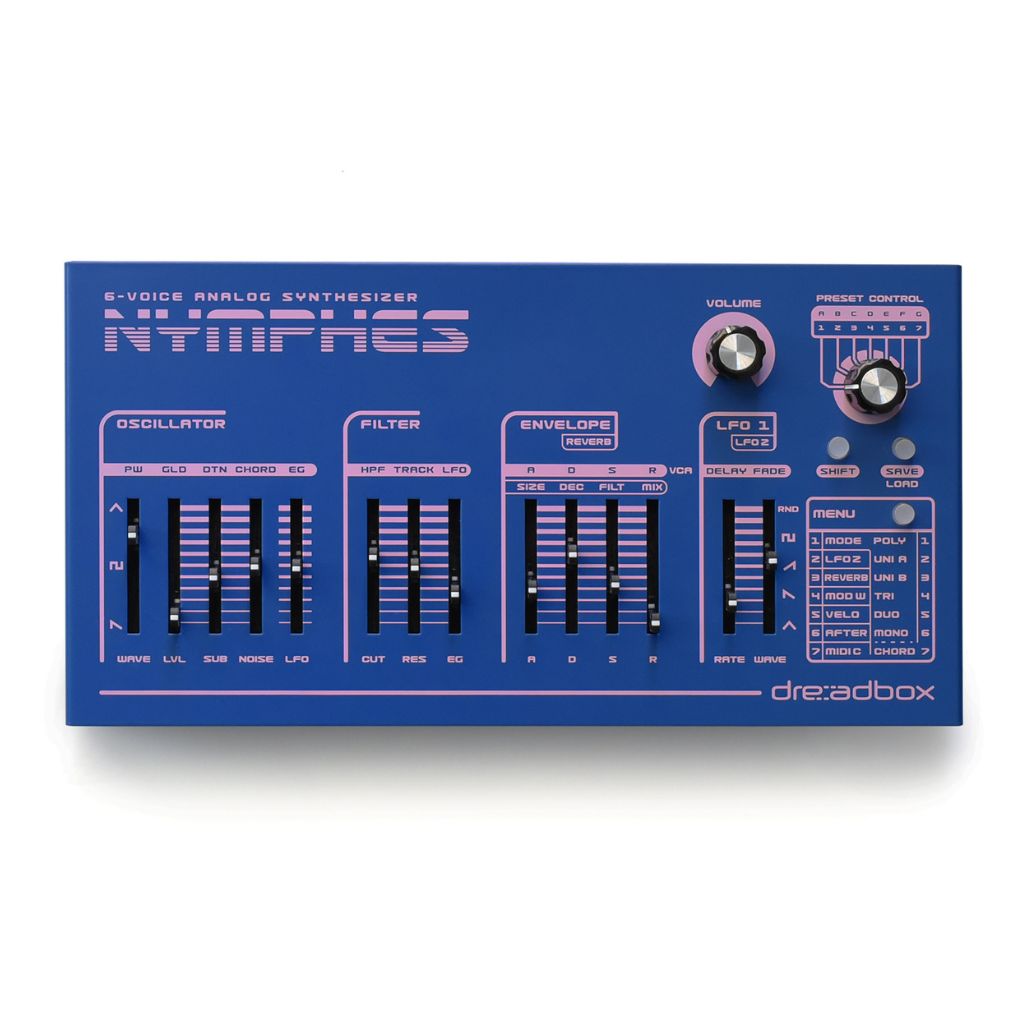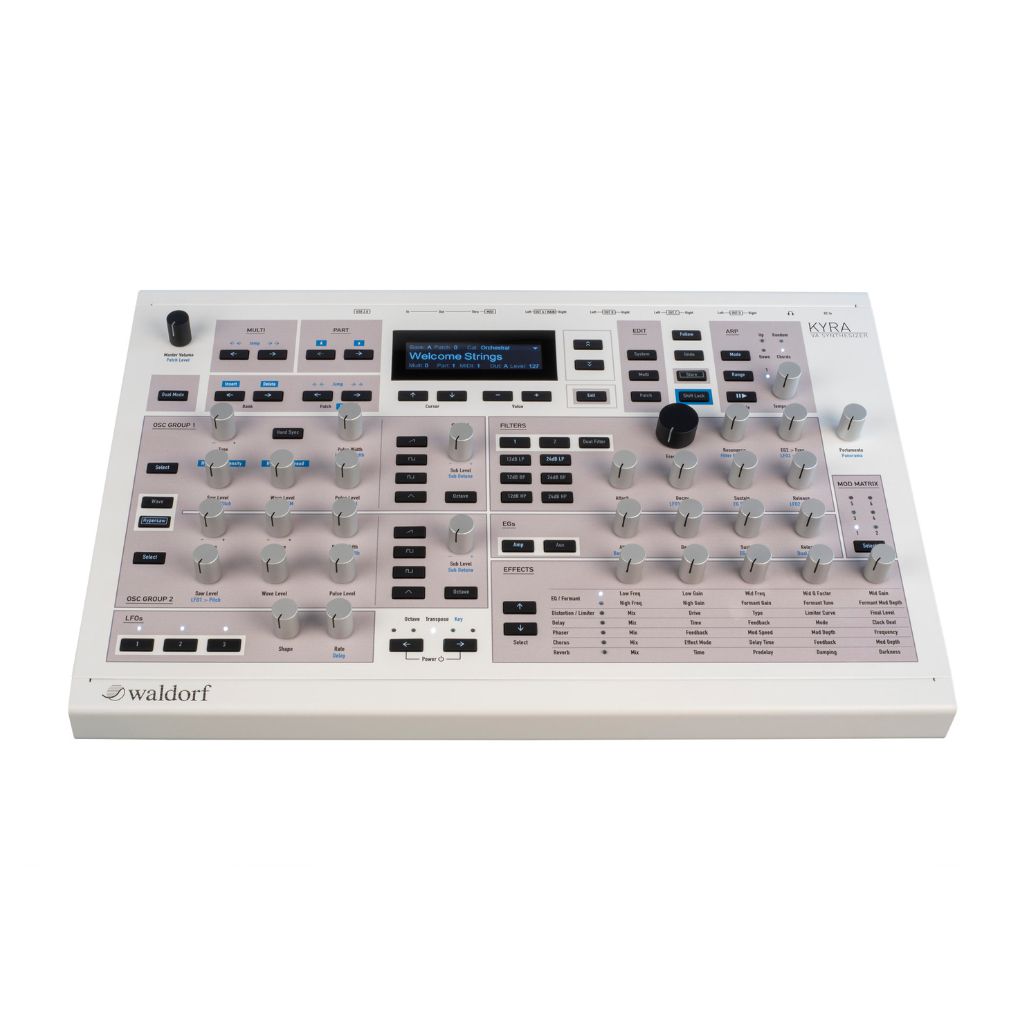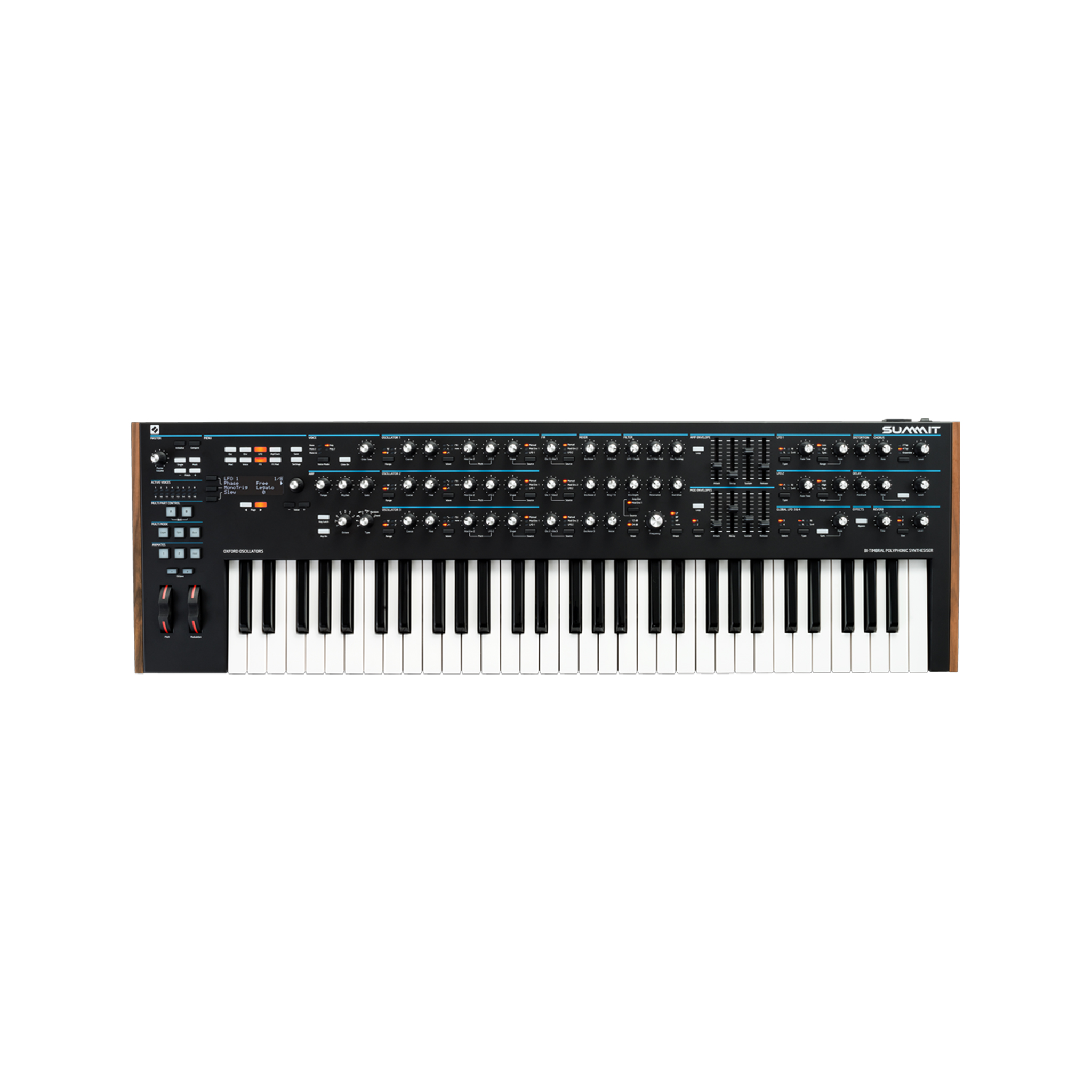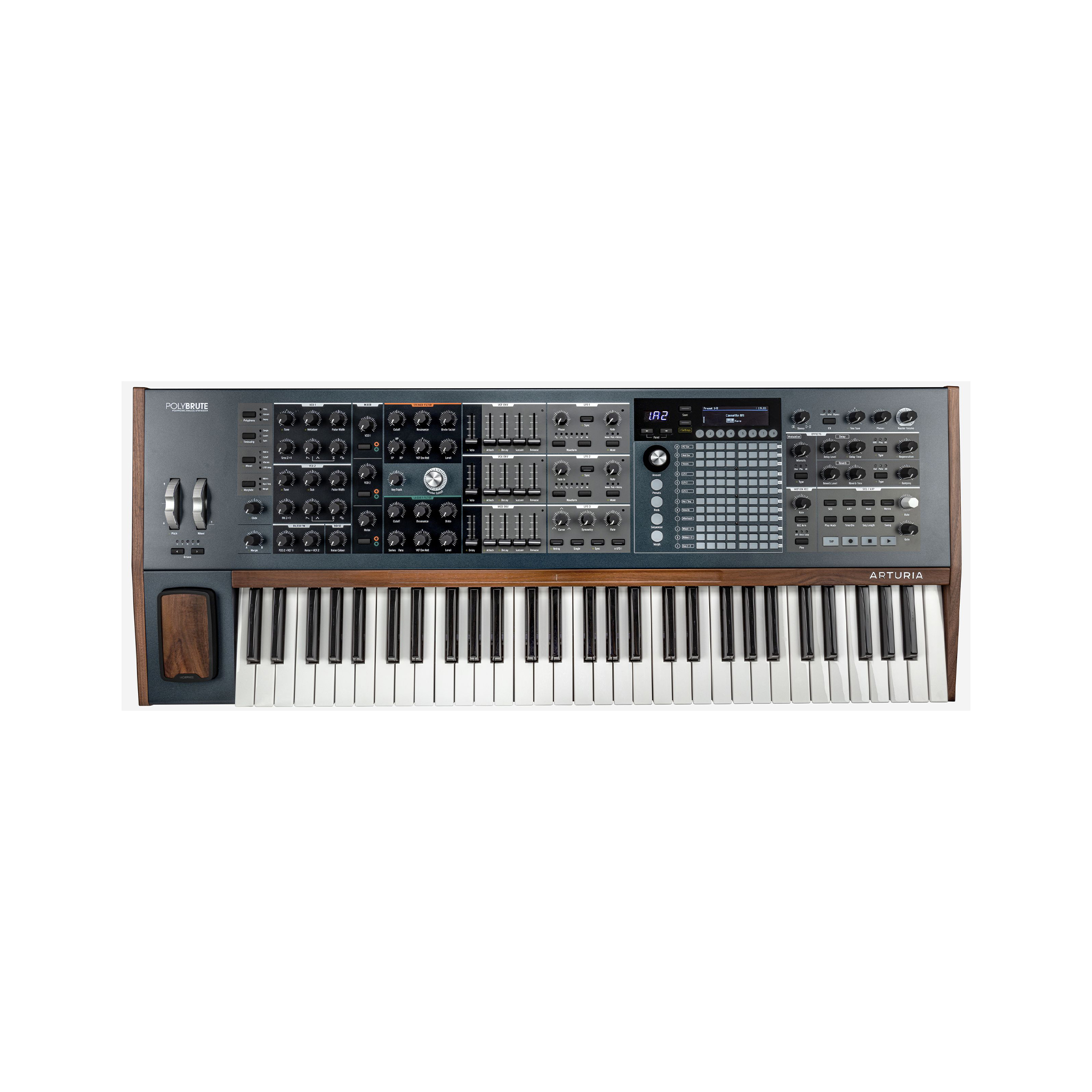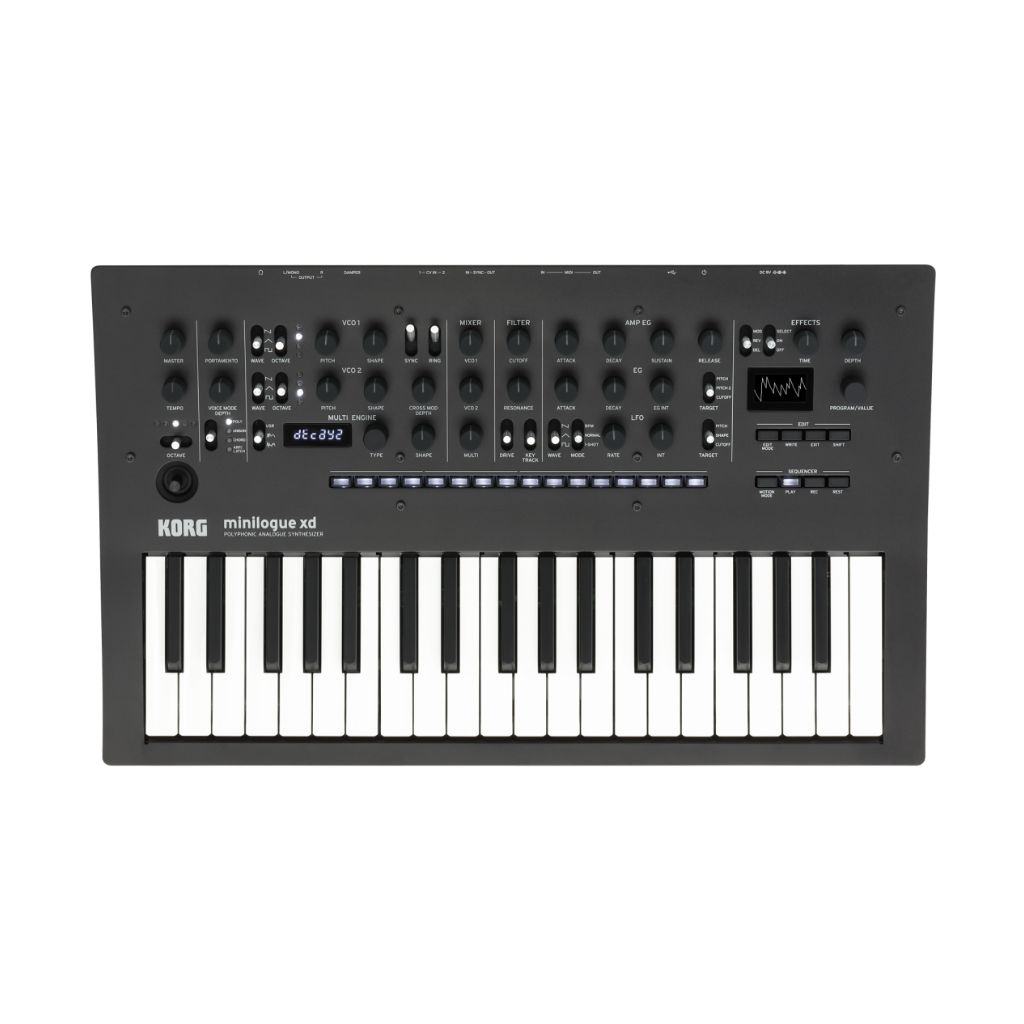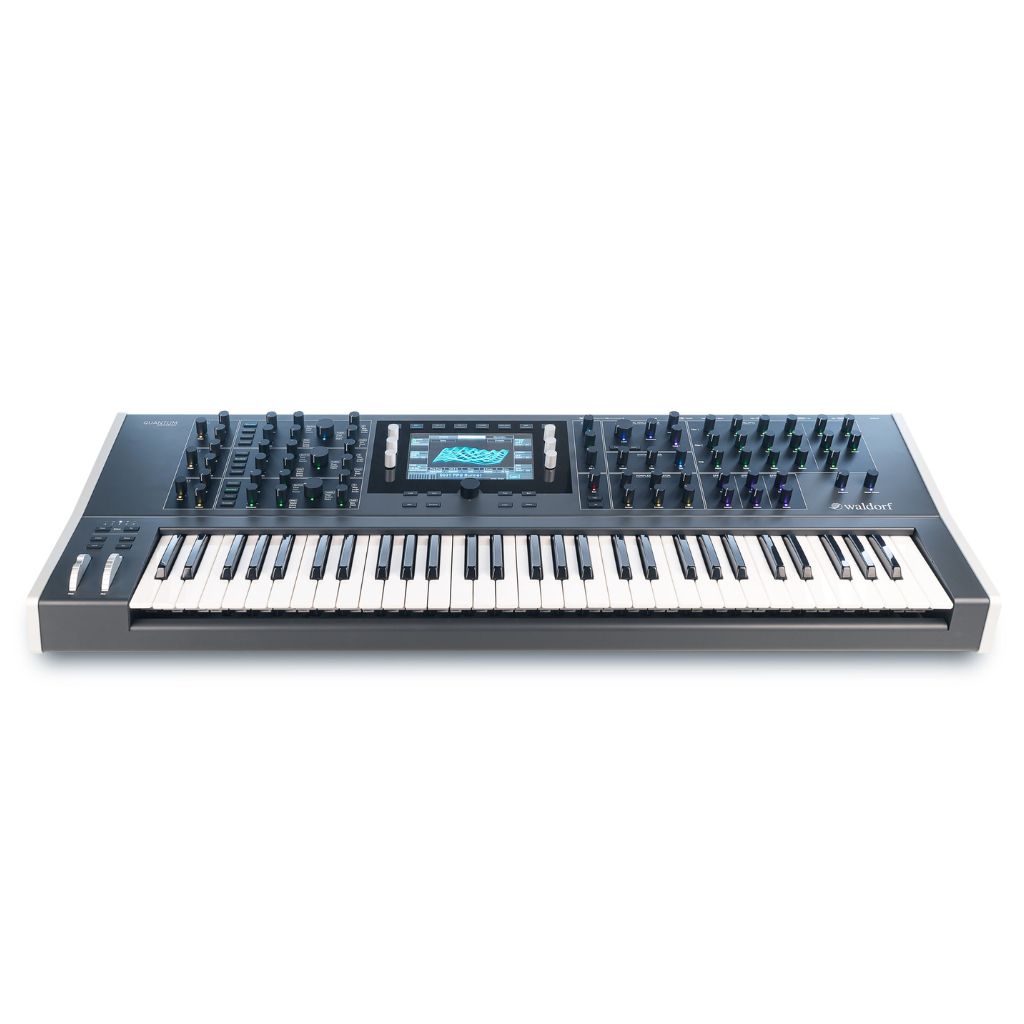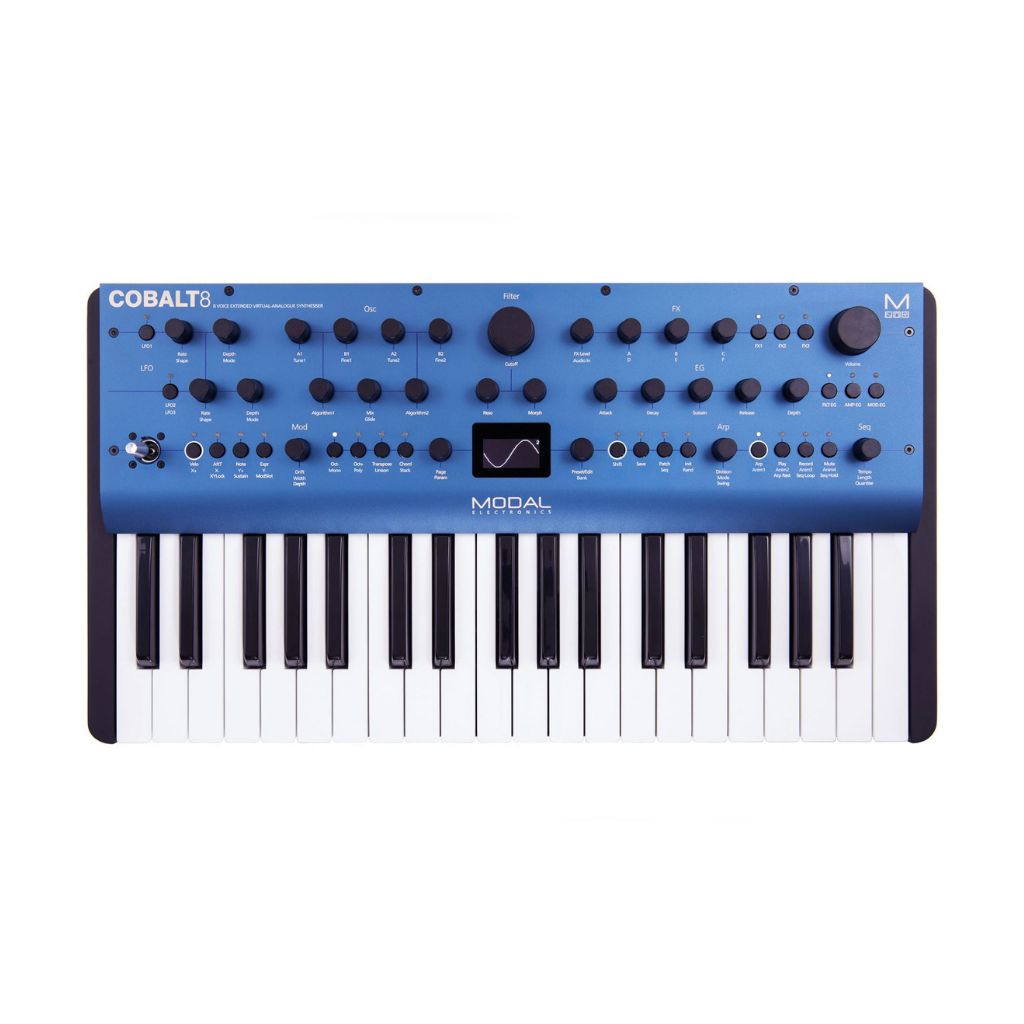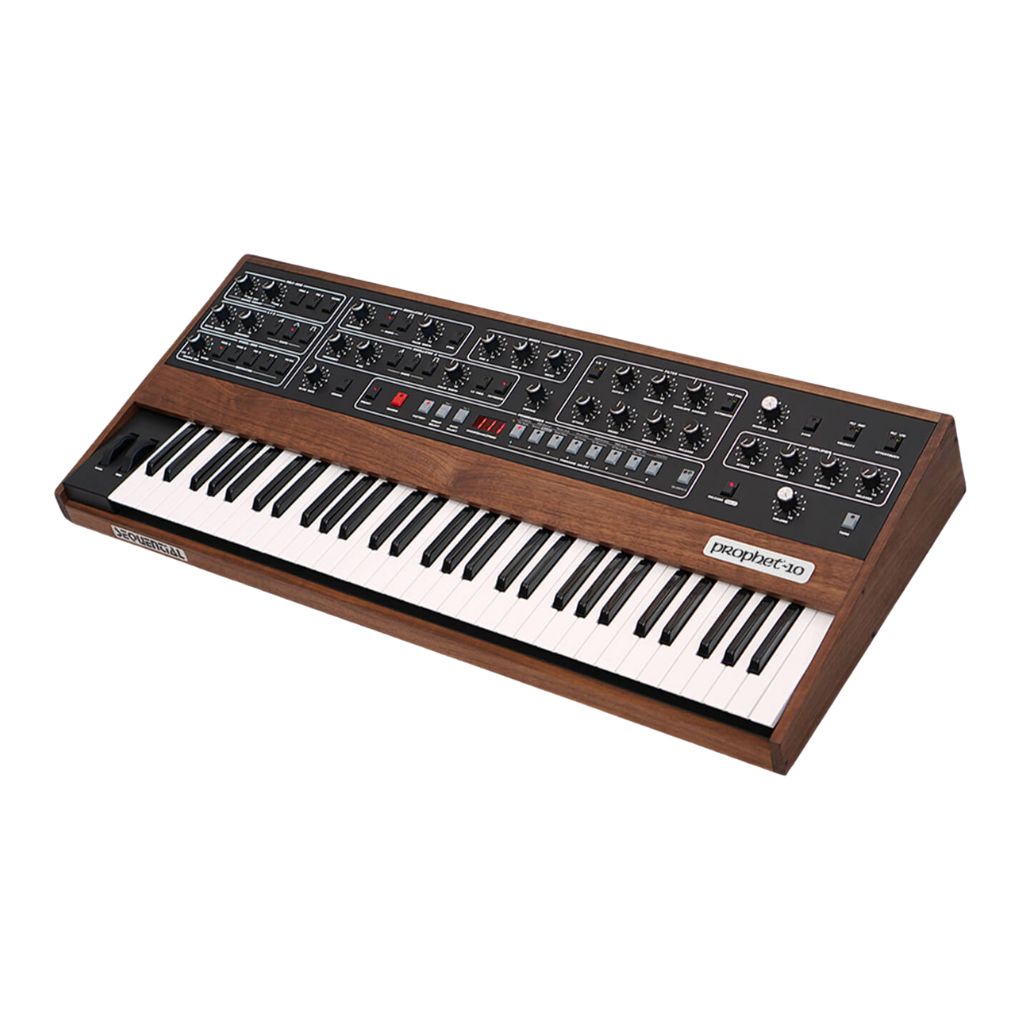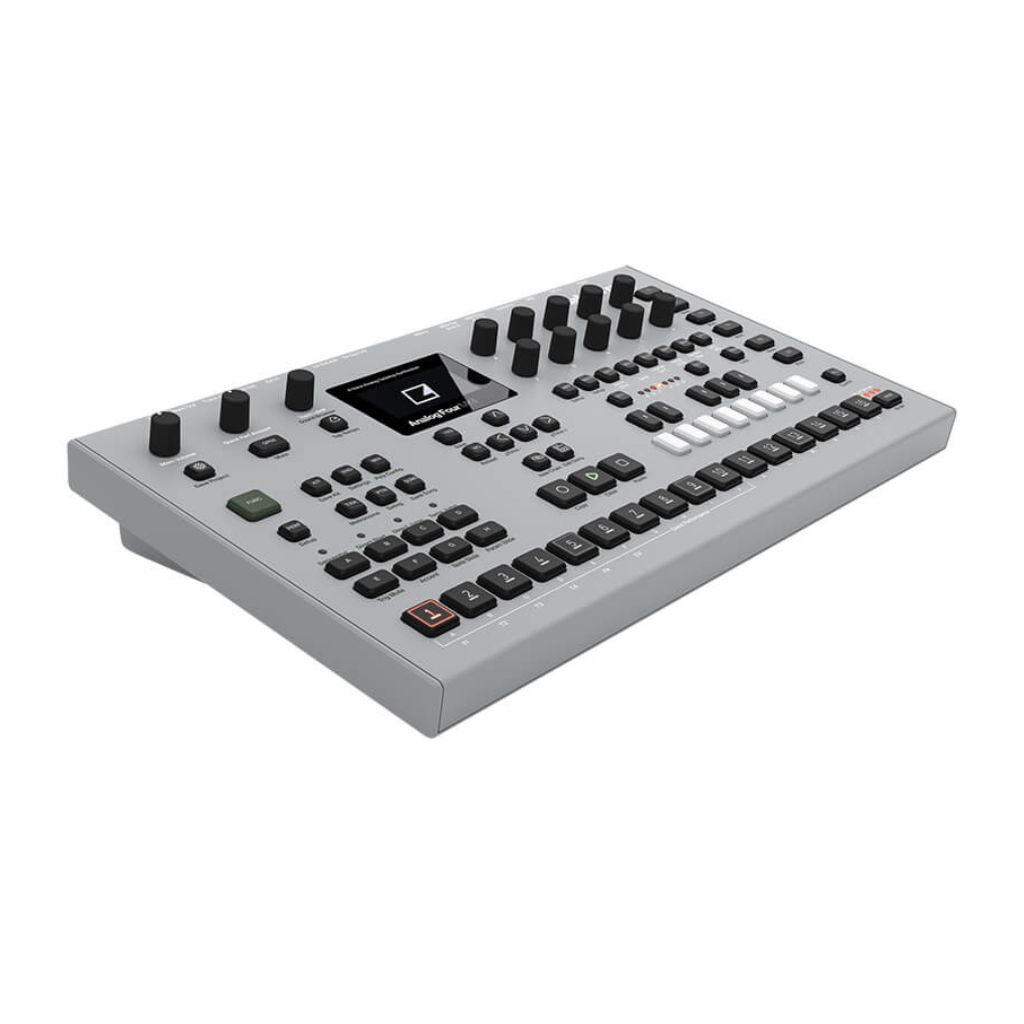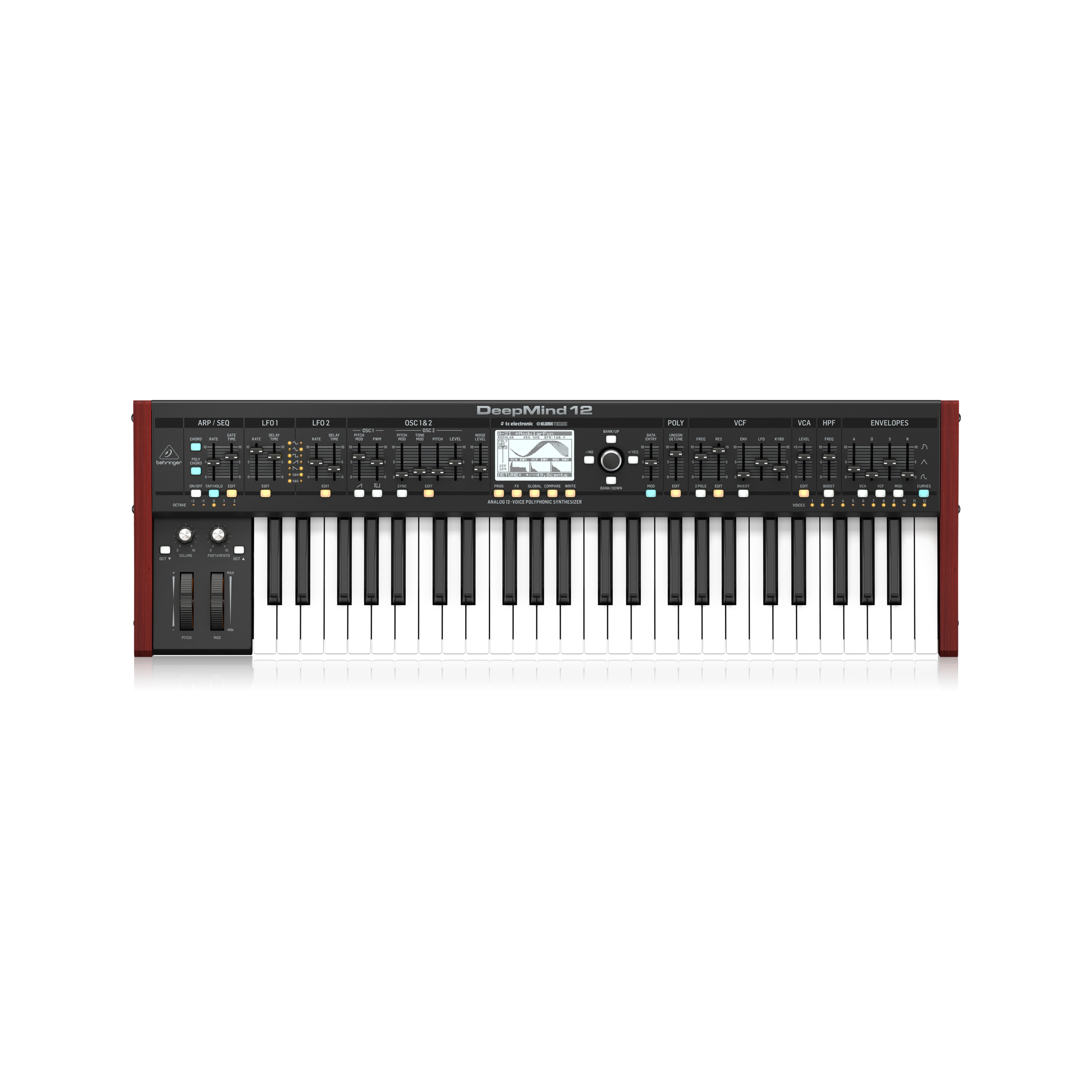The best synths to buy in 2024: 19 best polyphonic synthesizers to buy
There are many strengths in numbers.
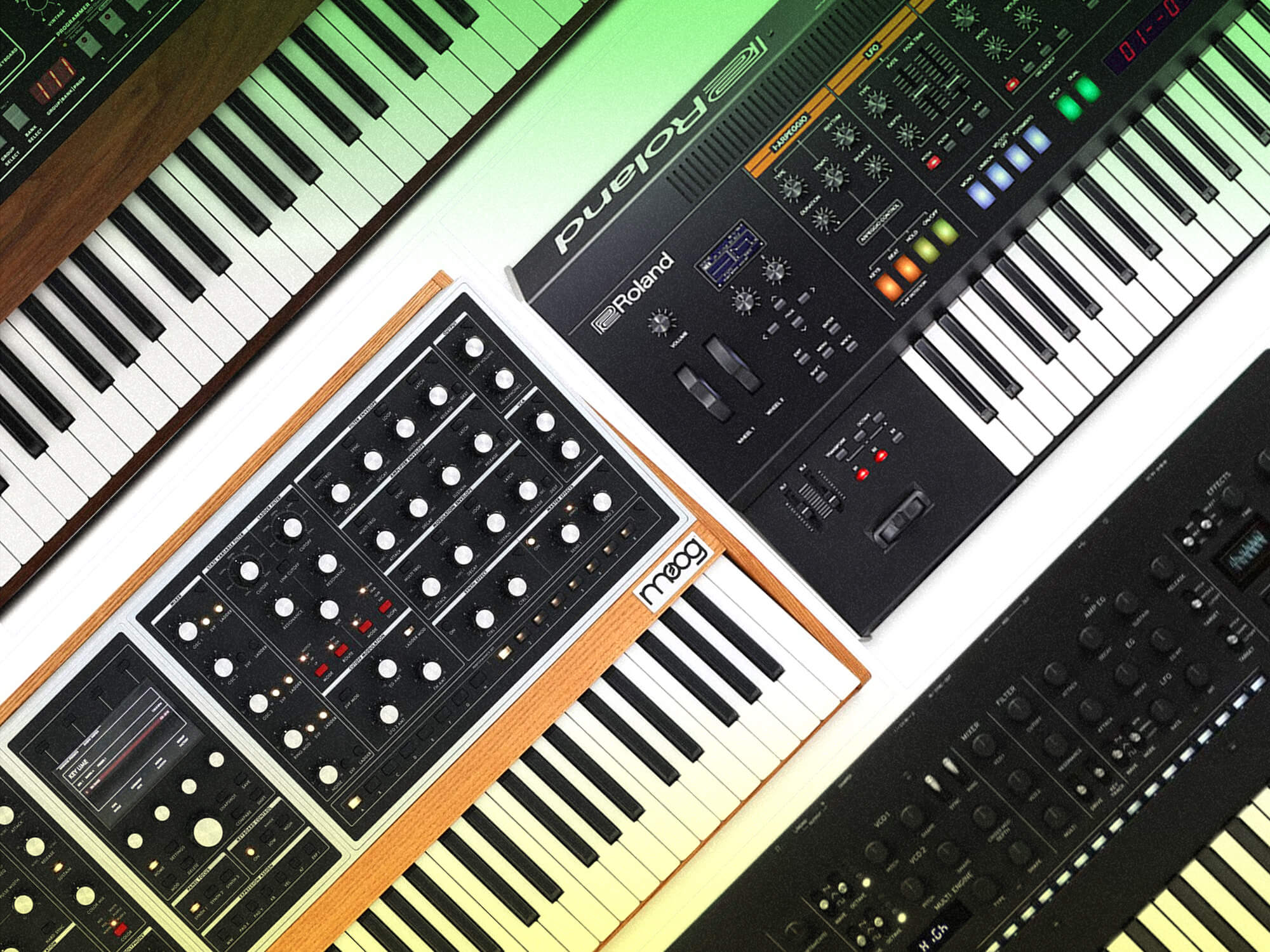
Complex chords, multi-timbral parts or lush ambient progressions – if you’re looking to fulfil any of these duties on a synth, then you’ll likely want one with polyphonic talents. A polyphonic synthesizer is one that is capable of playing multiple notes at a time, with each note often referred to as a voice.
In the last few years, hardware instruments have been enjoying a major resurgence; polysynths and their monophonic brethren now come in more shapes, sizes and employ more varied forms of synthesis than ever before.
Generally speaking, polysynths also tend to be more expensive than their monophonic counterparts; because each voice includes not just an oscillator, but often its own filter and envelope shaping components – things can get expensive fairly quickly.
In our list, we’ve compiled the best polysynths over a range of prices, so that – whether it’s a steadfast studio companion you’re looking for, or something compact to join the rest of your setup – you’ll be able to find the best one for you. Let’s dive in.
19 best polysynths at a glance:
- Oberheim OB-X8
- UDO Super 6
- Roland Jupiter X
- Ashun Sound Machines Hydrasynth
- Korg Wavestate
- Yamaha Montage M
- Moog One
- Dreadbox Nymphes
- Waldorf Kyra
- Roland Juno-X
- Novation Summit
- Arturia PolyBrute
- Korg Minilogue XD
- Waldorf Quantum
- Korg Opsix MKII
- Modal Electronics Cobalt8
- Sequential Prophet-10
- Elektron Analog Four Mk II
- Behringer Deepmind 12
Oberheim OB-X8
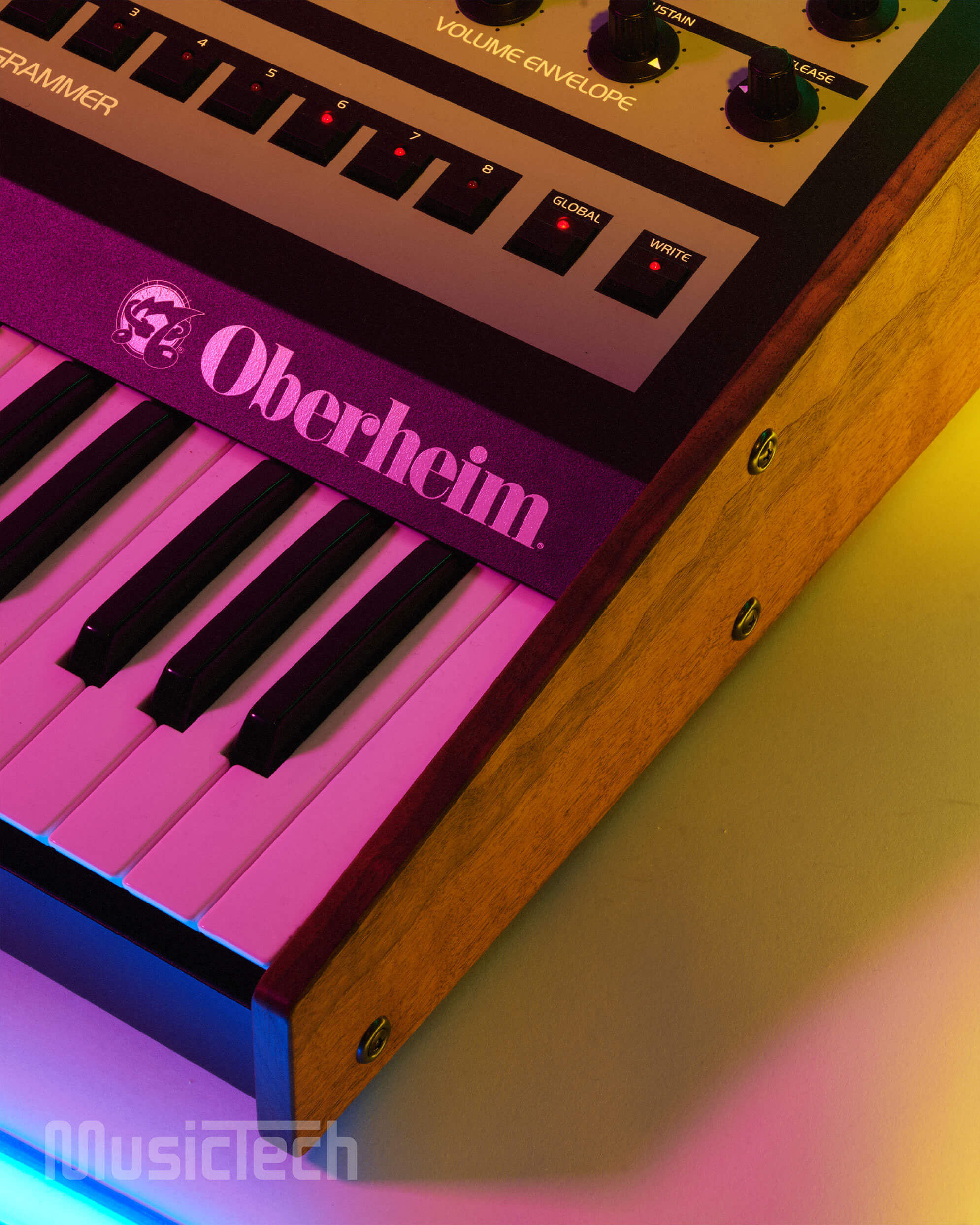
If you don’t know about Oberheim, then you should. Oberheim began in 1969, pioneering analogue synthesizers. Renowned for iconic sound, its synths are known for their warmth and versatility, having landed in some legendary studios over the years. The Oberheim synthesizer is renowned for its iconic sound and groundbreaking features, making it a staple in music production. With its rich analogue tones and versatile modulation capabilities, it’s a go-to choice for musicians seeking classic warmth and sonic versatility.
Key Features:
- Eight-voice polyphony
- Analogue voltage-controlled oscillators (VCOs)
- Dual multimode filters
- Ample modulation options
- Iconic Oberheim sound signature
- Price: $5,833
Buy one at Thomann.
UDO Super 6
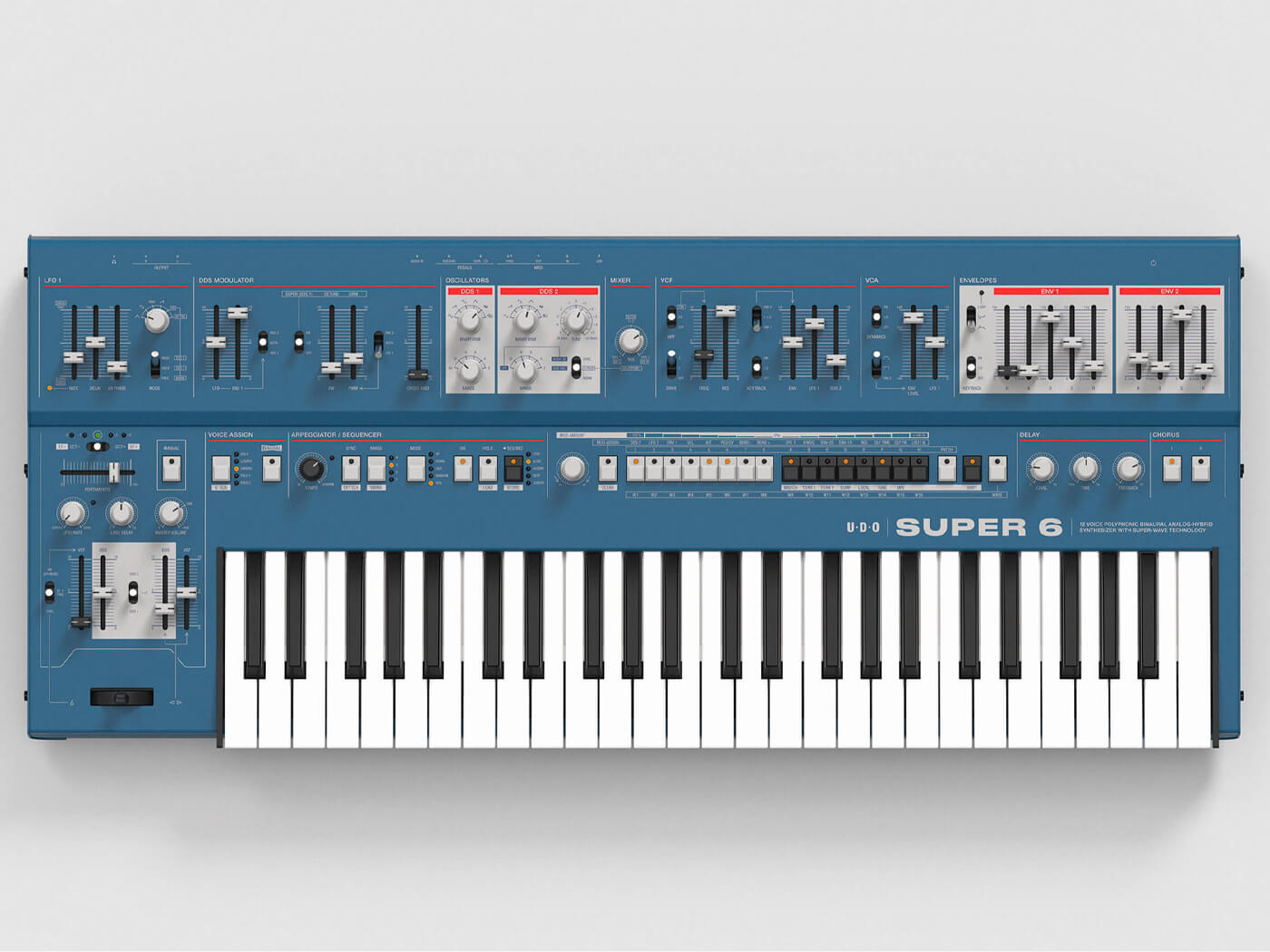
Bristol-based UDO caused quite the stir when it unveiled the Super 6, its inaugural instrument, at the 2019 Superbooth in Berlin. We’re happy to report that the polysynth lived up to the hype, earning not only a perfect score in MusicTech’s review, but a well-deserved Innovation Award as well.
The Super 6 is a 12-voice polysynth equipped with FPGA-driven DDS oscillators and a host of useful features and effects. One of the polysynth’s biggest draws is also its namesake; a unique binaural mode lets you mash its 12 voices down into six super voices, creating a distinct texture-thickening effect. This mode is the pathway down uncharted sonic territory, where riveting spatial effects shine and help set the synth apart from its peers.
The Super 6 is definitely an expert-level synth, especially for the money, but, if you’re looking for something replete with functions to get lost in, definitely consider it.
Features:
Price: £2200
Synthesis type: Analogue-hybrid
Polyphony: 12 voices
Keyboard: Fatar keybed, 49 keys
Effects: Stereo chorus, stereo delay
Read our full review here. Learn more at udo-audio.com.
Today’s best deals on the UDO Super 6
Roland Jupiter X
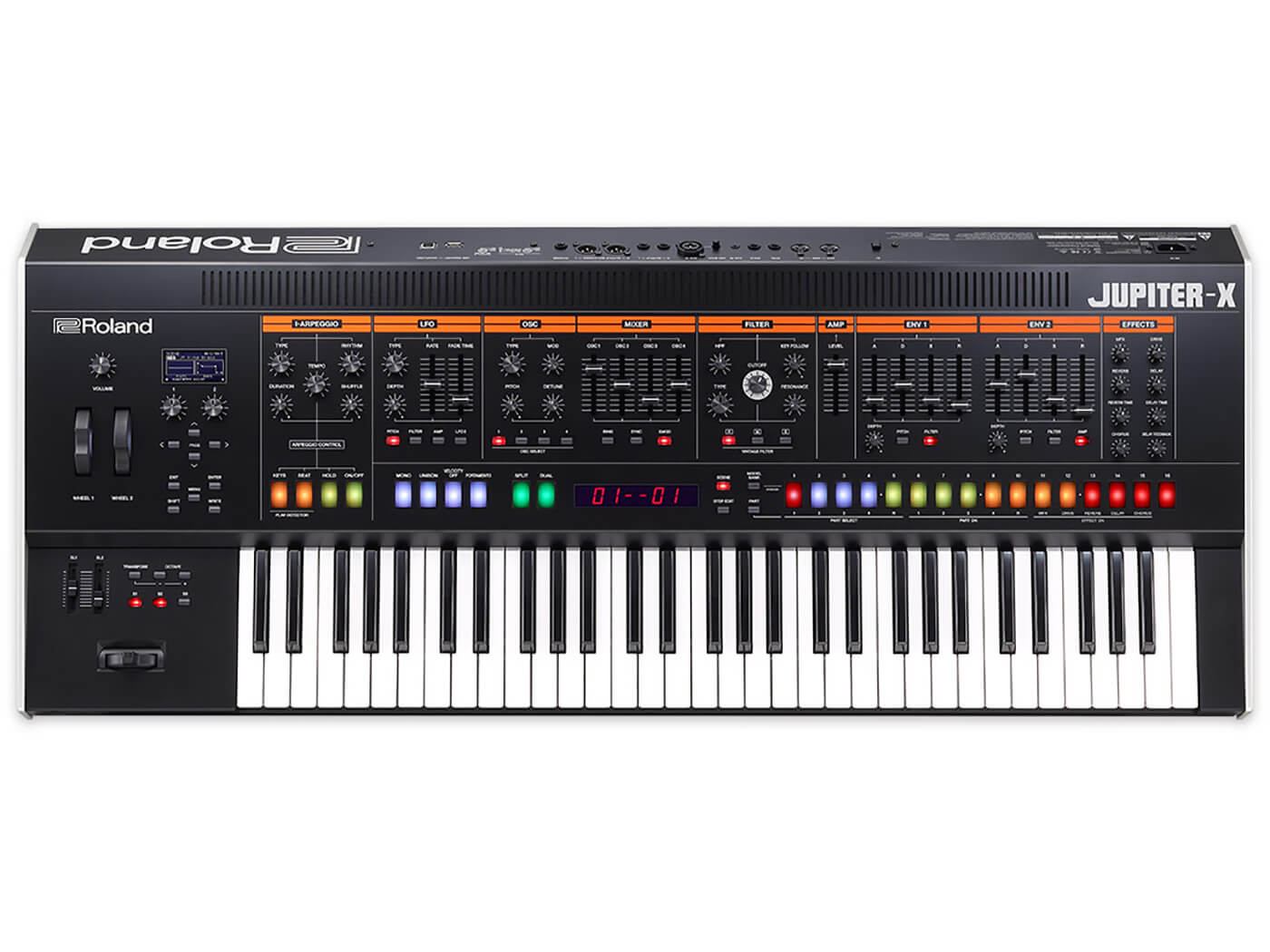
The voice of reason screams at the very thought of paying £10,000 for a pre-loved Roland Jupiter 8 – and yet, it’s hard to deny that few vintage polysynths have ever come to earn such high regard. Enter the Jupiter X, a convincing doppelganger of the esteemed classic that’s as much a joy to look at as it is to actually play.
- READ MORE: Vintage Rewind: The Roland Jupiter 8
Let’s address the elephant in the room: the Jupiter X is not an analogue device. However, Roland’s ZEN-Core technology, along with some cleverly engineered elements let you get pedantic with the emulation. There are options that let you decide the synth’s age (up to 100 year); detuning due to operating temperature, and also, whether to use a faux ‘circuit warm-up’ cycle.
Digital modelling also means that you aren’t limited to just emulating the Jupiter 8; the Jupiter X comes preloaded with other models such as the Juno 106, SH-101 and even drum machines like the TR-808/909 and CR-78.
Features:
Price: $2,799
Synthesis type: Subtractive
Polyphony: 32 voices
Keyboard: Semi-weighted, 61 keys
Pads: 16 button triggers
Effects: 90; multi-effects, 5x EQ, 7x reverb, 4x chorus, 5x delay, Overdrive, Compressor
Read our full review here. Learn more at roland.com.
Today’s best deals on the Roland Jupiter X
Ashun Sound Machines Hydrasynth
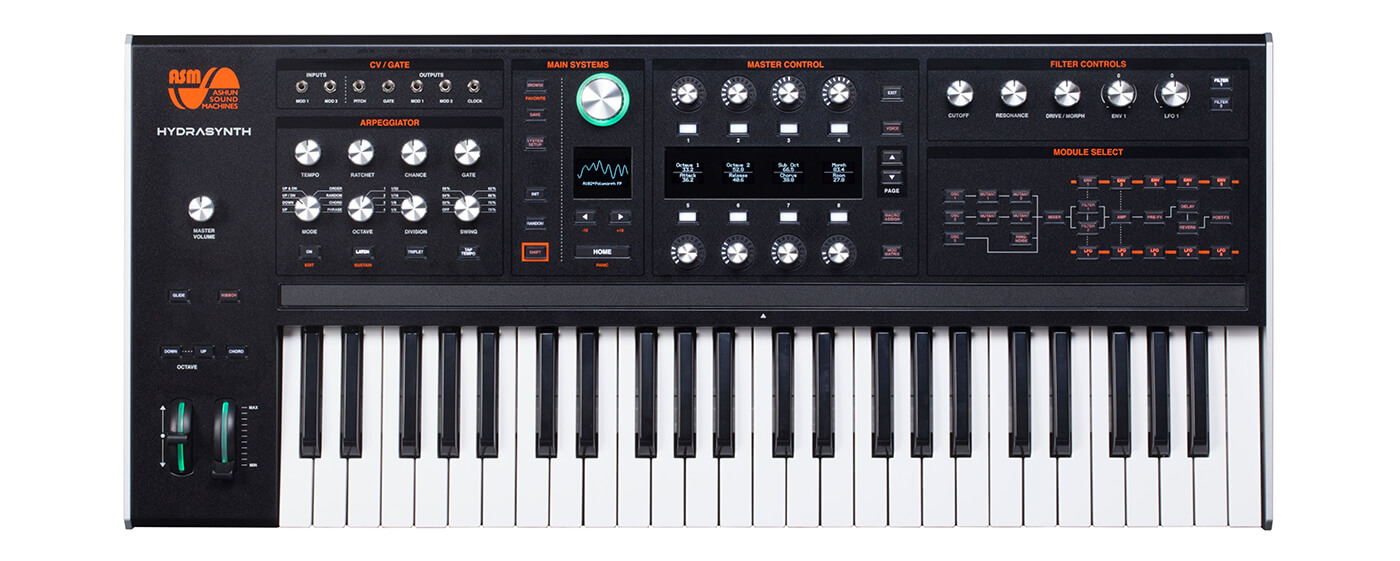
Deep sound designing talents and expressiveness come together in the Hydrasynth. This eight-voice polysynth has three wavetable oscillators per voice that let you create and morph sounds out of a selection of 219 single cycle waveforms.
The layout of the Module Select section is one of the Hydrasynth’s unsung strengths. This concise hub lets you access its three oscillators; four mutators; two filters; five envelopes, and five LFOs with the push of a button. Plus, it ensures that a glimpse of the Hydrasynth’s entire signal path is always just a head turn away.
Rounding off the Hydrasynth are some intuitive expression controls, including the brand’s own polyphonic aftertouch technology – aptly named polytouch – and a programmable ribbon strip controller.
Features:
Price: $1,299 (with keyboard) / $800 (desktop)
Synthesis type: Wave morphing
Polyphony: 8 voices
Keyboard: Full-sized, 49 keys
Effects Types: 4x reverbs, 5x delays, chorus, flanger, rotary, phaser, Lo-Fi, tremolo, EQ, compressor
Other I/O: 2x mod in, pitch out, gate out, 2x mod out, clock out
Read our full review here. Learn more at ashunsoundmachines.com.
Today’s best deals on the Ashun Sound Machines Hydrasynth
Korg Wavestate
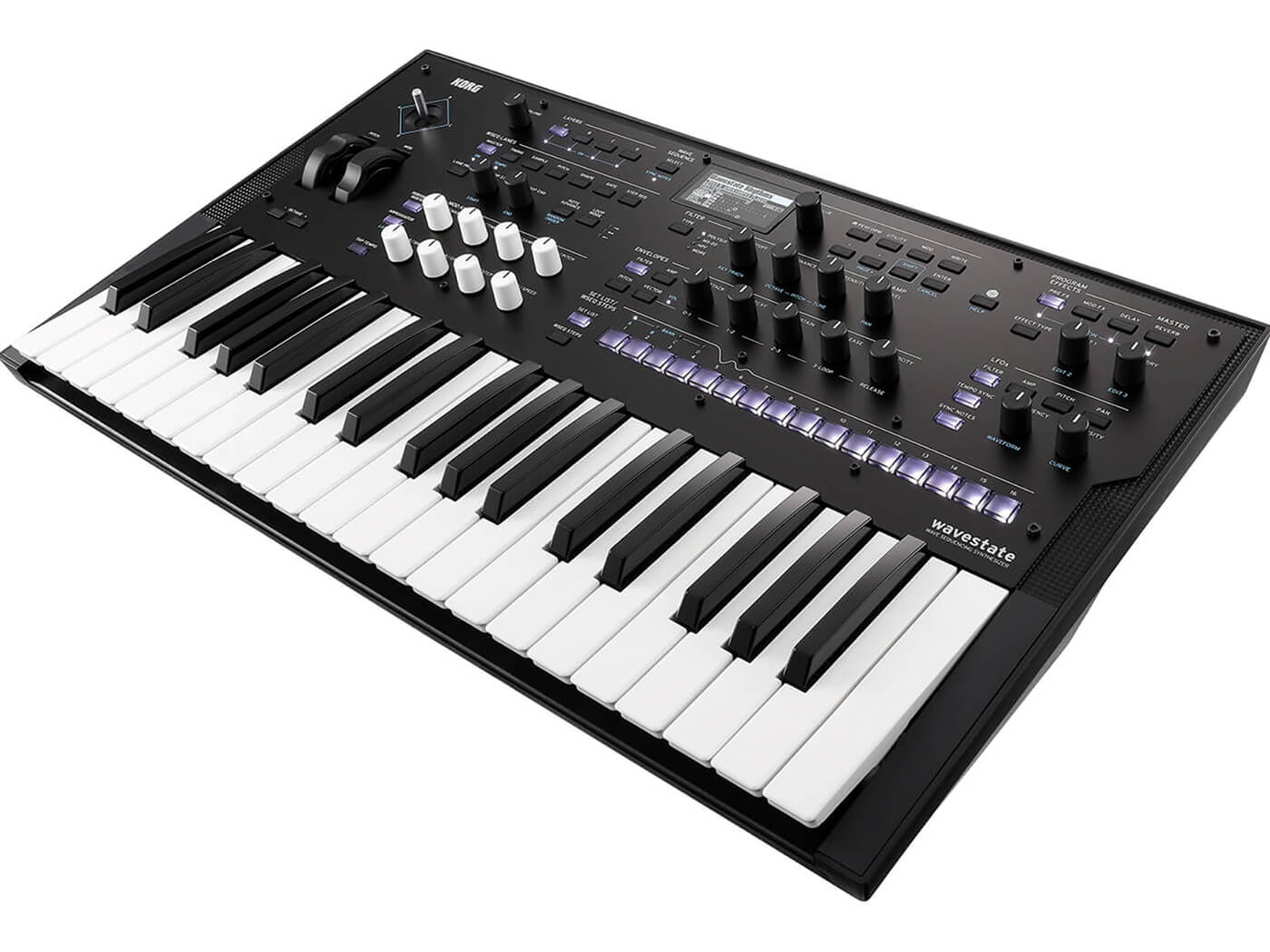
In the early 1990s, Korg introduced the world to the Wavestation, and with it, a rhythmic new looping concept dubbed wave sequencing. Not completely unlike step programming, it allowed music-makers to combine samples to form new sounds which could be triggered via MIDI.
- READ MORE: Vintage Rewind: Korg Wavestation
Wavestate, and its wave sequencing 2.0, modernises this concept by introducing a smattering of new parameters tied to pitch, volume and more. This lets the Wavestate achieve its signature hypnotic sounds, while boasting a much more organic feel than its predecessors.
The Wavestate also steps up the original’s user experience significantly, introducing an array of knobs, switches and buttons that befit the wave sequencing experience.
Features:
Price: $749
Synthesis type: Wavetable
Polyphony: 64 stereo voices
Keyboard: Full-sized, 37 keys
Effects: chorus, flanger, phaser, wah, delay, tape echo, reverb, ring modulator, guitar amp, compressor
Read our full review here. Learn more at korg.com.
Today’s best deals on the Korg Wavestate
Yamaha Montage M
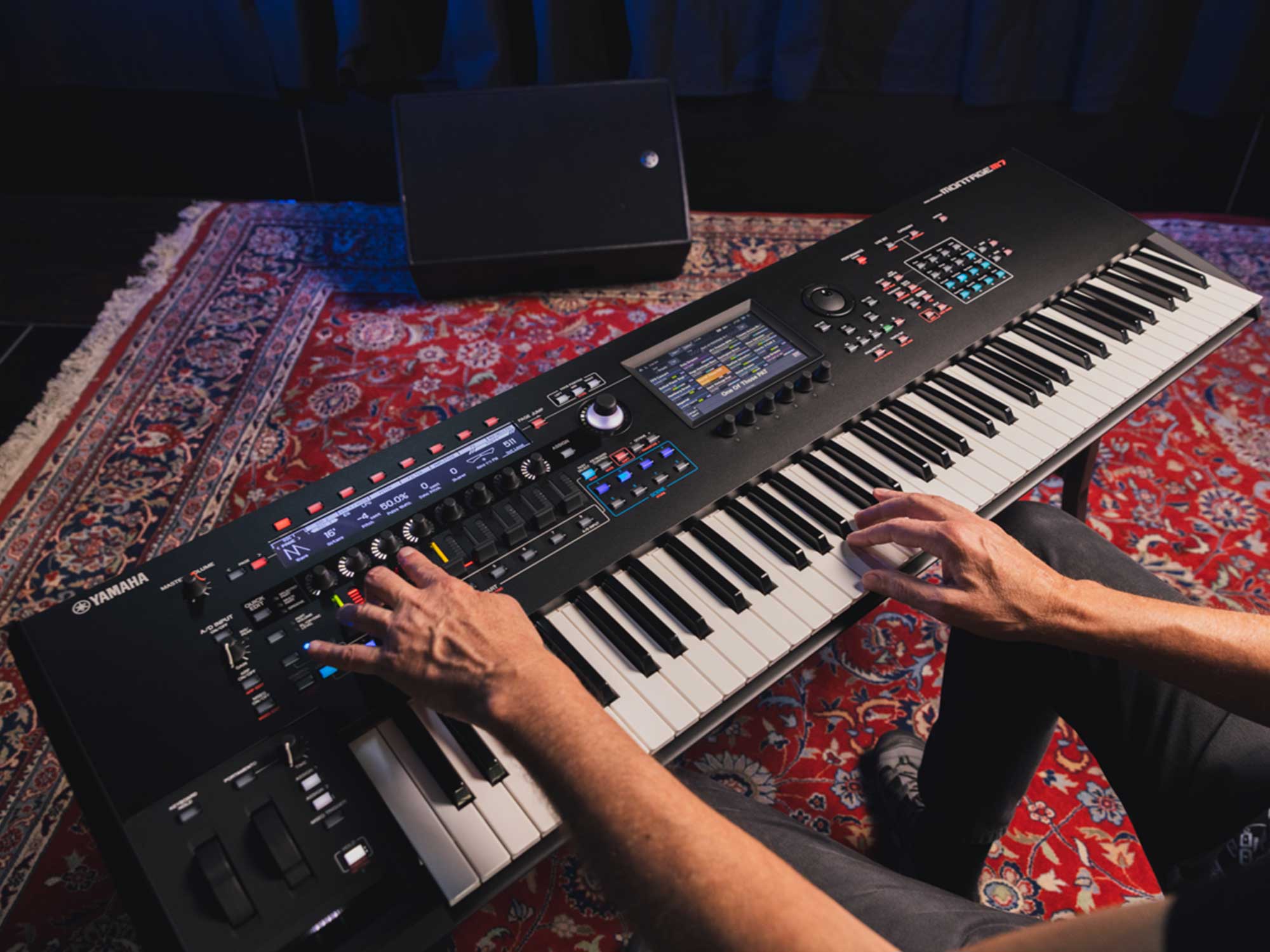
Yamaha’s Montage M series boasts up to 400 notes of polyphony. The series includes AN-X engine for warm analogue-style sounds, improved AWM2 for realistic tones, and FM-X for dynamic FM synthesis. Models come in 61, 76, and 88-key variants, priced from $3,500 to $4,500.
The flagship M8x features GEX Action technology enabling Polyphonic Aftertouch, reminiscent of Yamaha’s iconic CS-80 and DX1 synths, with key repetition behaviour akin to grand pianos.
Features:
- Price: $3,500 to $4,500
- Synthesis type: Virtual analogue, FM
- Polyphony: 400 voices
- Keyboard: 61, 76, or 88 keys
- Other I/O: USB audio and MIDI connectivity
Find out more at Yamaha.
Moog One
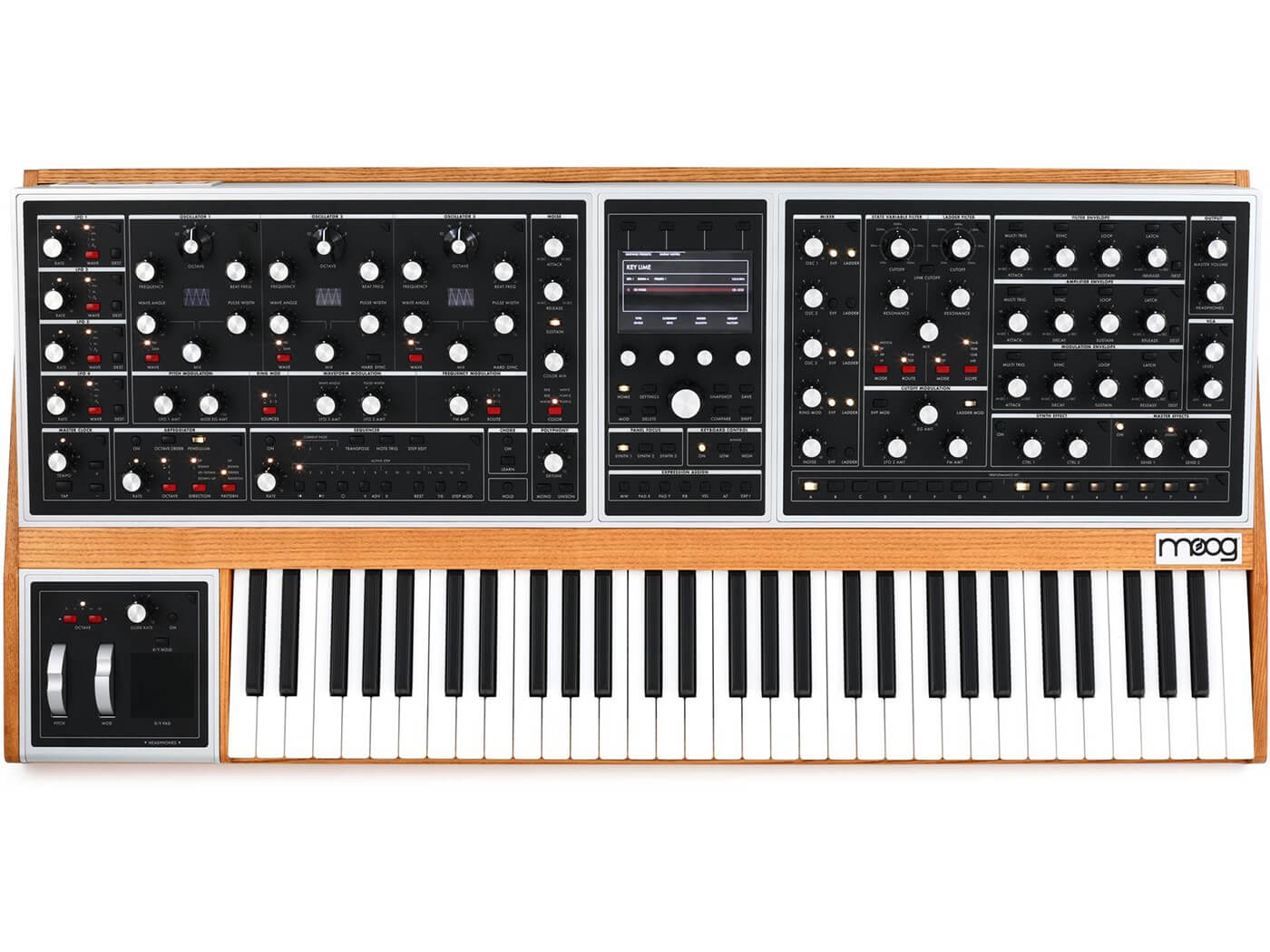
The Moog One was the first polysynth announced by the iconic brand in 35 years – so it goes without saying that expectations were stacked particularly high. Fortunately, the long gestation period led to the development of a synth – packed with innovations and features – that will surely stand the test of time.
Heavy on the sound design experience, the Moog One offers 200 knobs and switches on its front panel. It offers tri-timbral polyphony, bolstered by three dual-output analogue VCOs with ring mod and frequency modulation, two independent analogue filters, a dual-source analogue noise generator, an analogue mixer with external audio input, four LFOs, and three envelope generators.
The fully analogue device also sports its own sequencer, arpeggiator, and an array of useful effects – including reverbs from Eventide.
Features:
Price: $6,499
Synthesis type: Subtractive
Polyphony: 8 or 16 voices
Keyboard: Fatar keybed, 61 keys
Effects Types: chorus, delay, phaser, bit-reducer, vocoder, reverbs
Other I/O: 4x quarter-inch TS (CV out), 2x quarter-inch TS (CV in), 1x RJ45 LAN (expansion)
Learn more at moogmusic.com.
Today’s best deals on the Moog One
Dreadbox Nymphes
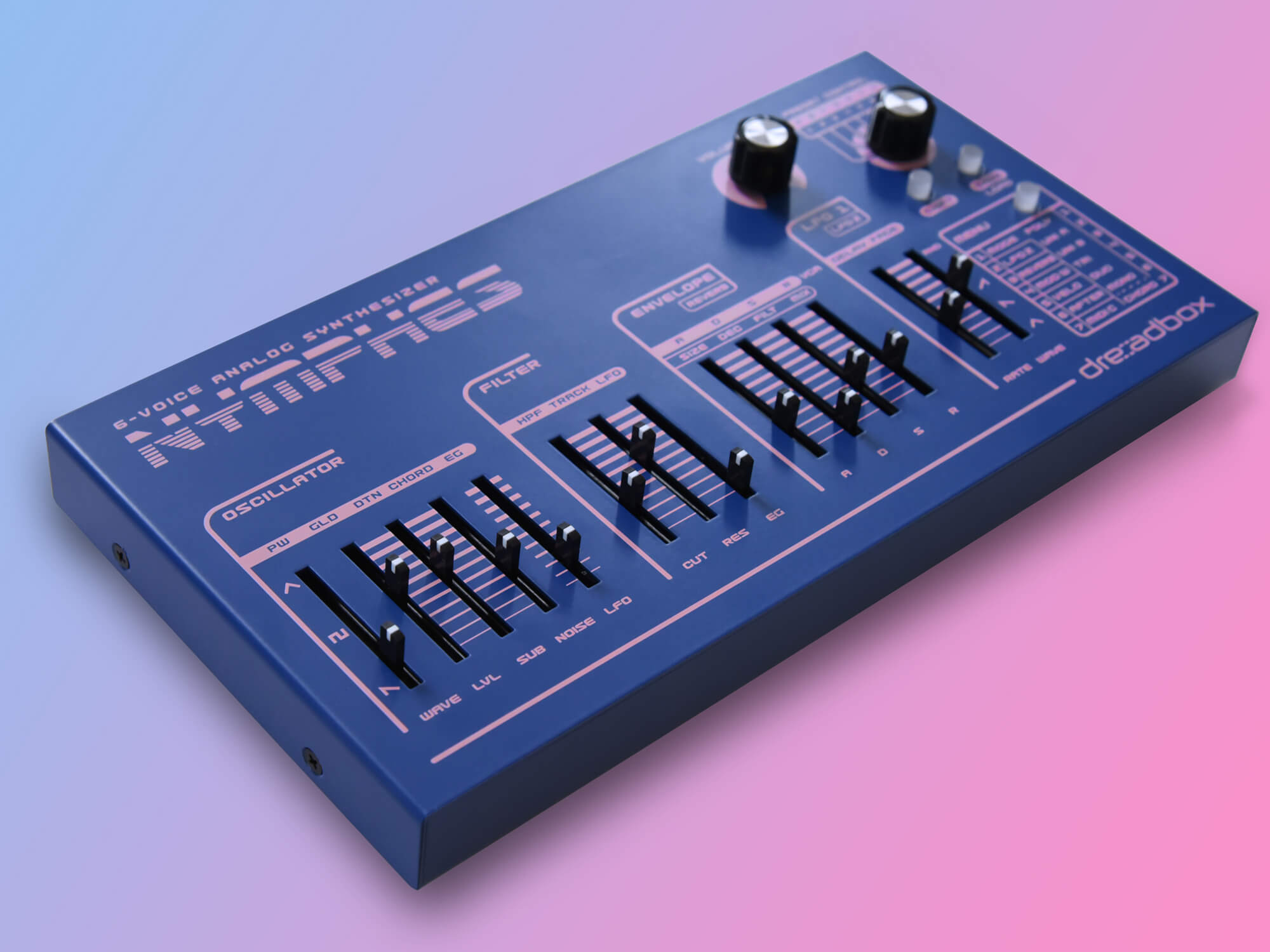
Dreadbox’s Nymphes is a quirky synthesizer ideal for producers looking for something a little different. While its functions can be a fiddle at first, the analogue warmth it produces is a sufficient reward for your toils. For such an affordable price, you get MIDI control over every parameter, a lush sounding reverb and a weighty slab of complex sound design options.
In our review of Nymhpes, we said: “Nymphes offers multiple sonic personalities, with rasping basses, ethereal pads, spiky, wonky melodies, blunt sounds perfect for sequencing and a host of options for electronic percussion. Its sound is deep, broad and versatile but, just as significantly, it’s not awash with flashy gimmicks trying to impress you.”
Features:
Price: $599
Synthesis type: Wavetable
Polyphony: 6 voices
Effects Types: FV-1 Digital Reverb
Other I/O: 1 x 1/4″ TS, 1 x 1/8″, MIDI In/USB
Read the full review here. Learn more at dreadbox-fx.com.
Today’s best deals on the Dreadbox Nymphes
Waldorf Kyra
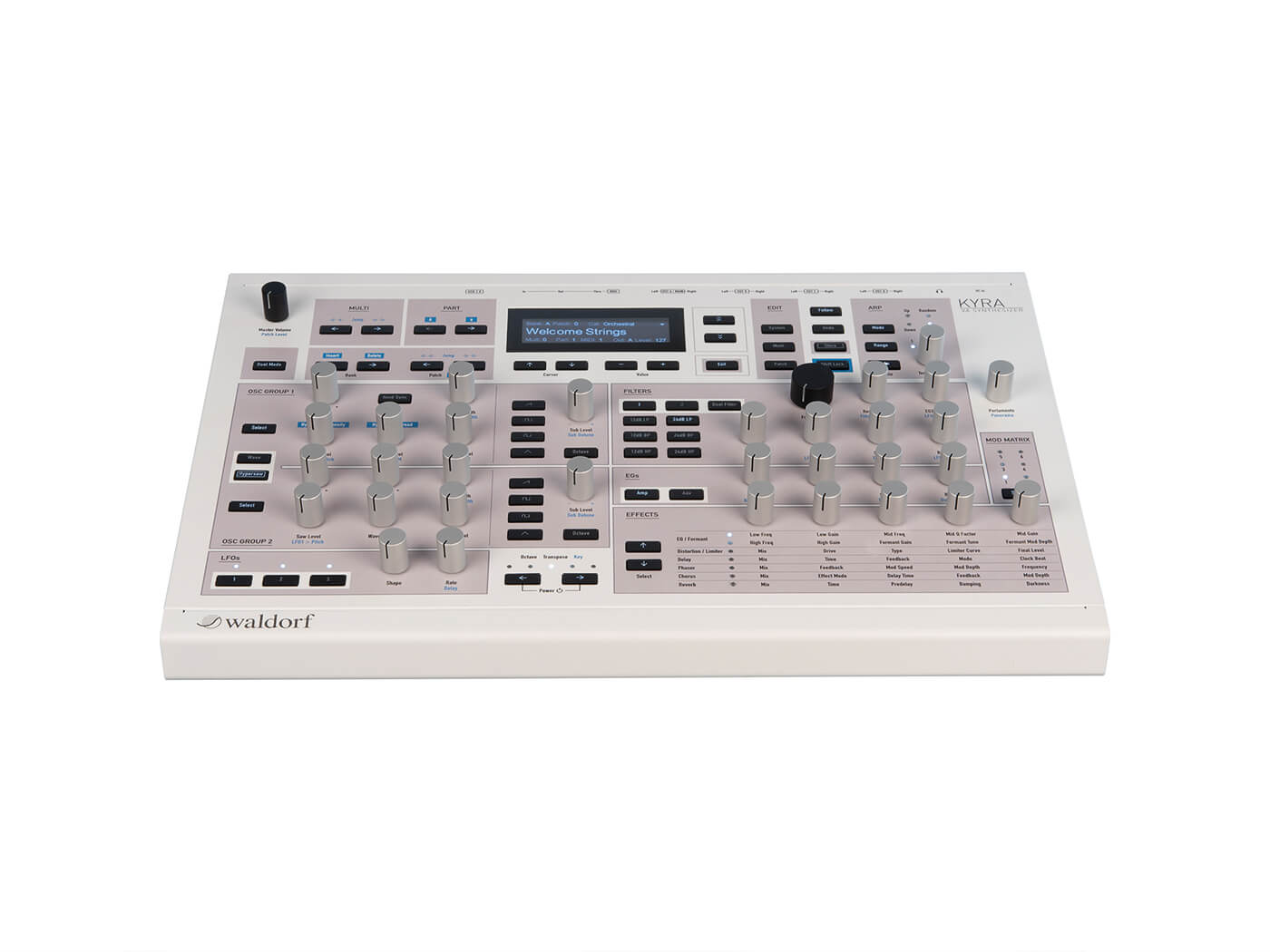
The Waldorf Kyra is a powerful virtual analogue desktop synth capable of delivering absolutely massive sounds. It splits into eight independent parts, each offering 32 voices of polyphony; its own effects chain, and two comprehensive oscillator groups, where you’ll find saw, pulse, and a selection of 4096 wavetable shapes.
Each oscillator voice can be run in either Wave or Hypersaw mode. The former gives you the freedom to construct sounds through subtractive synthesis, while the latter’s algorithm features six oscillators that can very quickly create lush soundscapes.
The Kyra is also particularly appealing if you’re working in contemporary production; its user-friendly interface and the immediacy with which you can sculpt colossal sounds just means more time to focus on the creative process.
Features:
Price: $2,499
Synthesis type: Wavetable
Polyphony: 128 voices, 32/part
Effects: Distortion, Stereo Delay, Phaser, Chorus, Flanger, Doubling, Reverb, Filter
MIDI I/O: In/Out/Thru/USB
Read our full review here. Learn more at waldorfmusic.com.
Today’s best deals on the Waldorf Kyra
Roland Juno-X
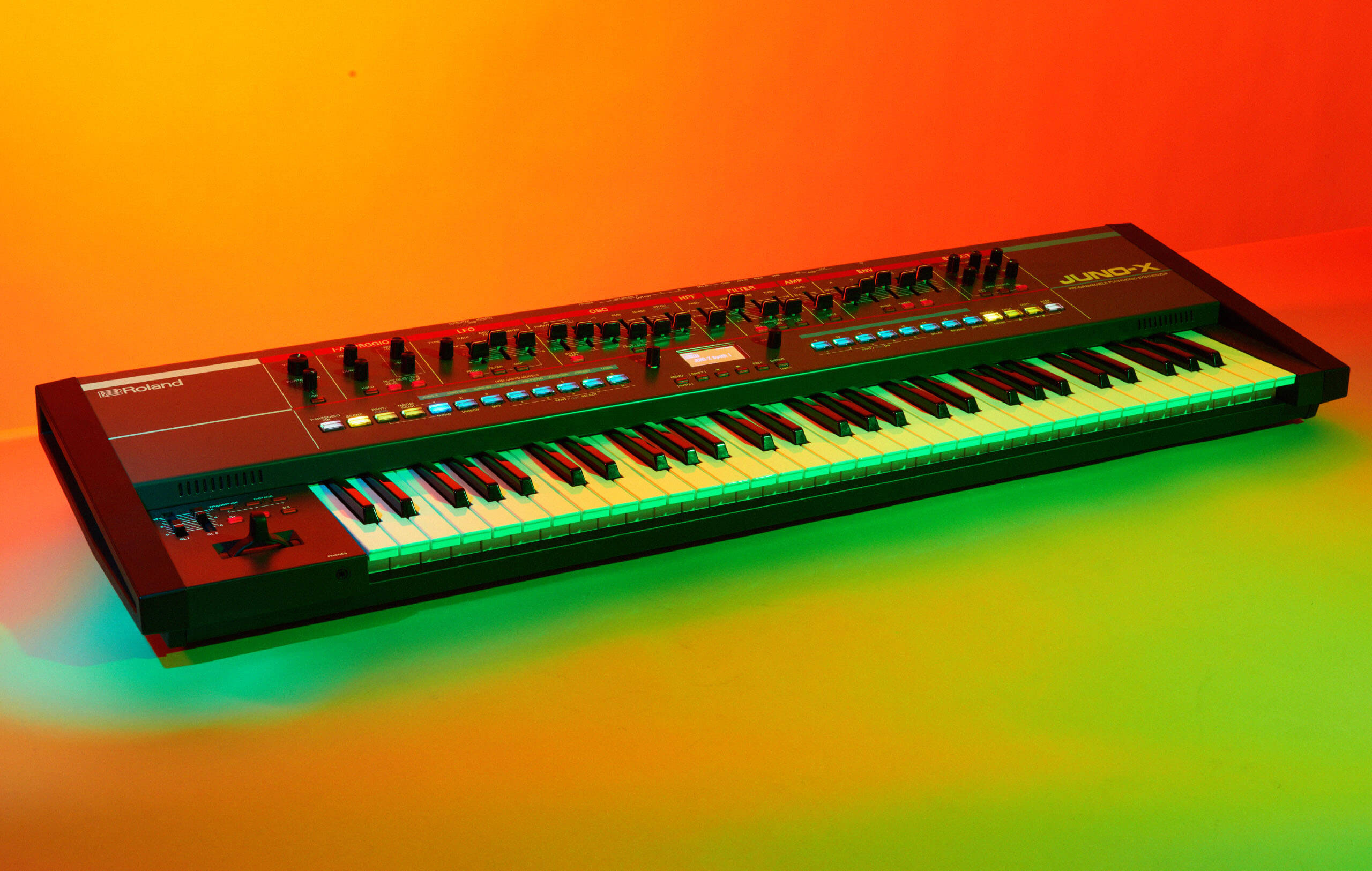
If you’ve ever dreamed of owning a battery-powered JUNO-60 or 106 with built-in speakers – well, here it is. The Roland Juno-X is a versatile digital polysynth, uniting classic Juno aesthetics with modern functionality. Boasting 61 velocity-sensitive keys, aftertouch, and Zen-Core technology, it offers over 4,000 presets, multi-layered scenes, and I-Arpeggio. It’s a solid choice for producers looking for that classic Juno sound with intuitive control in a compact package.
MusicTech reviewed the Juno X in 2022, praising its “beautiful, distinctly Juno design”, Zen-Core tech which provides “almost-endless sounds”, and its Scenes function. Read the full review on MusicTech.
Features:
- Price: £1,689 GBP / $1,666 USD / €1,999 EUR
- Synthesis Type: Digital with Zen-Core Technology
- Polyphony: Not specified in the provided information.
- Keyboard: 61-key velocity-sensitive with aftertouch
- Effects: Reverb, delay, drive, and more
Find out more at zZounds
Novation Summit
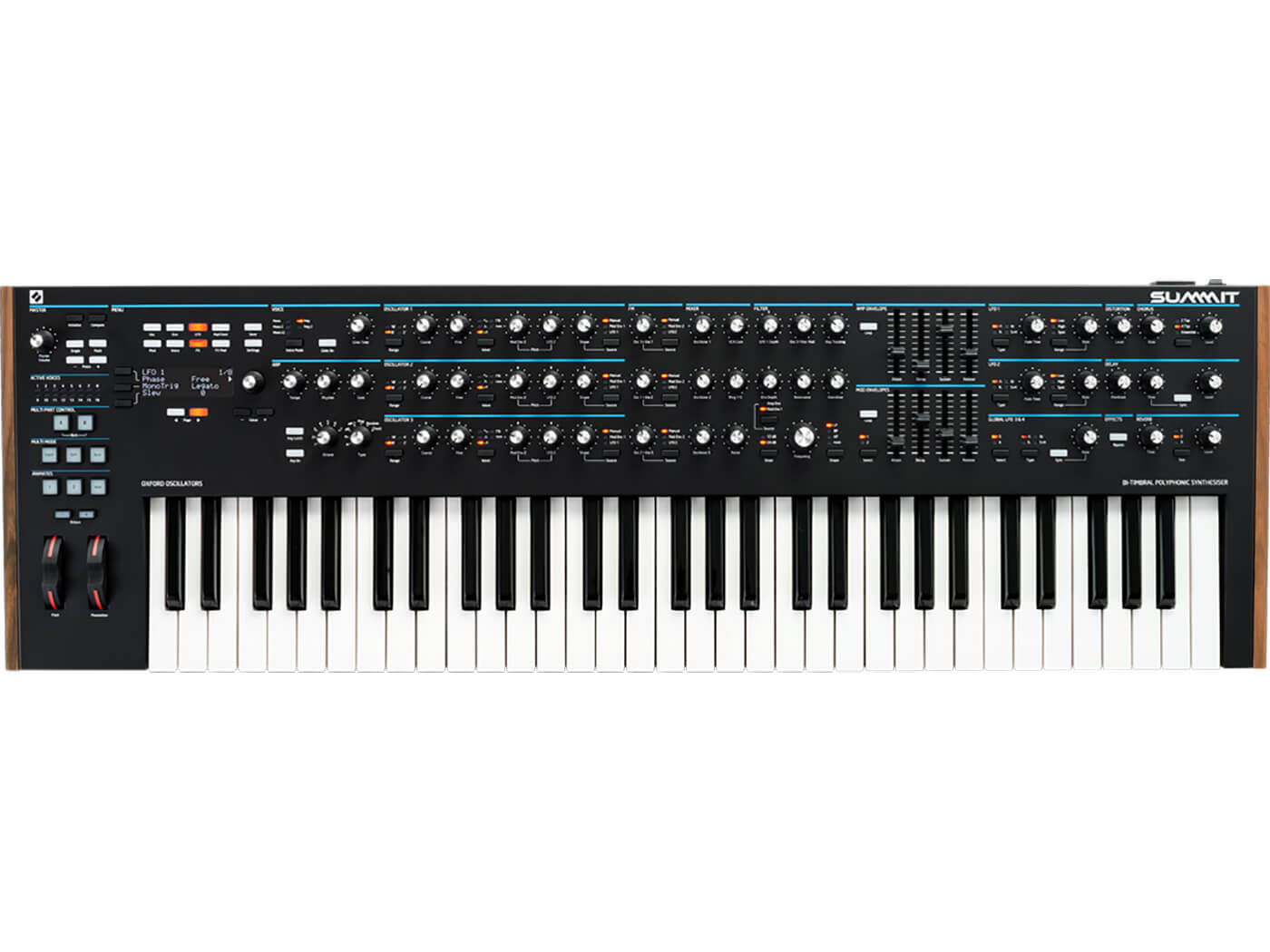
The Novation Summit puts together two of the brand’s Peak desktop synths into a single package – but it’s not quite as simple as doubling up on everything.
In addition to bi-timbral operation, new hardware and software features make it onto the Summit, including a semi-weighted keyboard with 61 keys and a new voice section with five mono and poly modes.
Through its three oscillators, you’re able to craft sounds through subtractive, wavetable (60 waveshapes) and FM synthesis. Plus, access to twin Peaks gives you the flexibility to run two simultaneous patches – split or stacked – for key-centric or layered sounds.
Features:
Price: $2,199
Synthesis type: Subtractive, FM and wavetable
Polyphony: 16 voices
Keyboard: Semi-weighted keybed, 61 keys
Effects Types: Analog Distortion, Reverb, Chorus, Delay
Other I/O: 1x 1/8″ (CV mod in)
Read our full review here. Learn more at novation.com.
Today’s best deals on the Novation Summit
Arturia PolyBrute
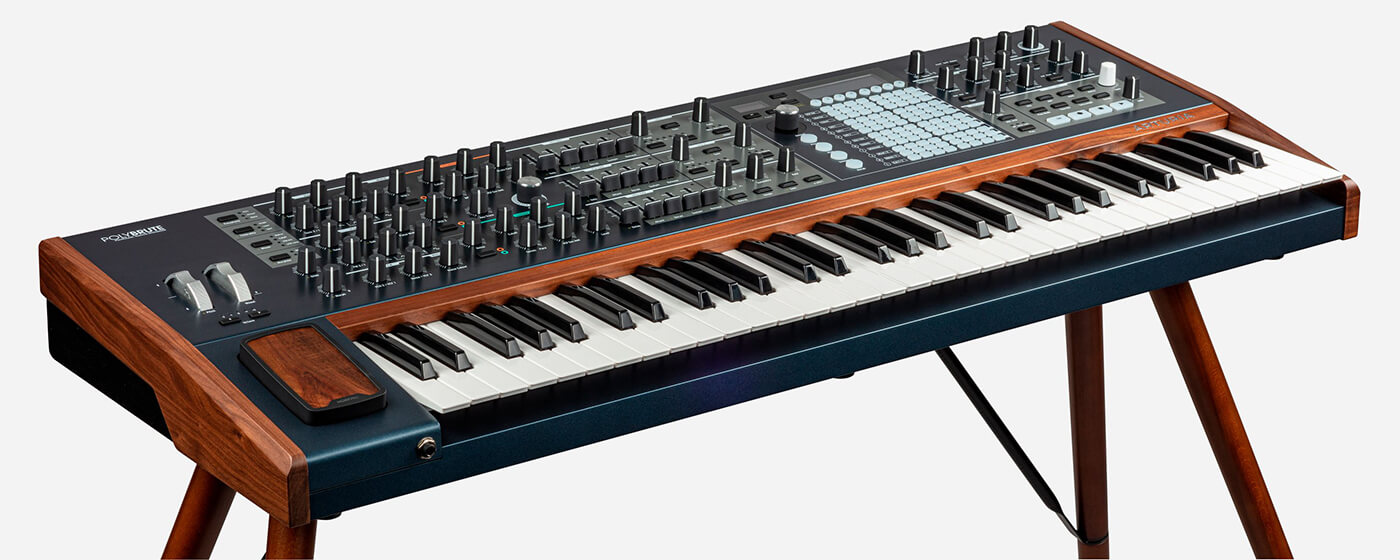
As you might have guessed from its name, the PolyBrute is Arturia’s polyphonic take on the beloved analogue beast that is the MatrixBrute. This six-voice polysynth gives you two waveshaping oscillators; a ladder and Steiner filter, which can be run in parallel or serial; three envelopes and three LFOs.
The PolyBrute implements its expression features neatly into its overall design. In addition to mod and pitch wheels, a Morphée controller gives you pressure-sensitive X, Y and Z expression. Plus, something you might miss out on: there’s a ribbon strip worked right into the wooden front panel.
Deep shaping abilities and an elegant design come together in a luxurious-looking polysynth, and so, it’s expected that the PolyBrute comes at a premium. However, its comprehensiveness makes it an ideal studio companion for tackling productions of all kinds.
Features:
Price: $2,899
Synthesis type: Subtractive, FM
Polyphony: 6 voices
Keyboard: Full-sized keybed, 61 keys
Effects: Modulation, Delay, Reverb
Other I/O: 1x 1/8″ (sync in), 1x 1/8″ (sync out)
Read our full review here. Learn more at arturia.com.
Today’s best deals on the Arturia PolyBrute
Korg Minilogue XD
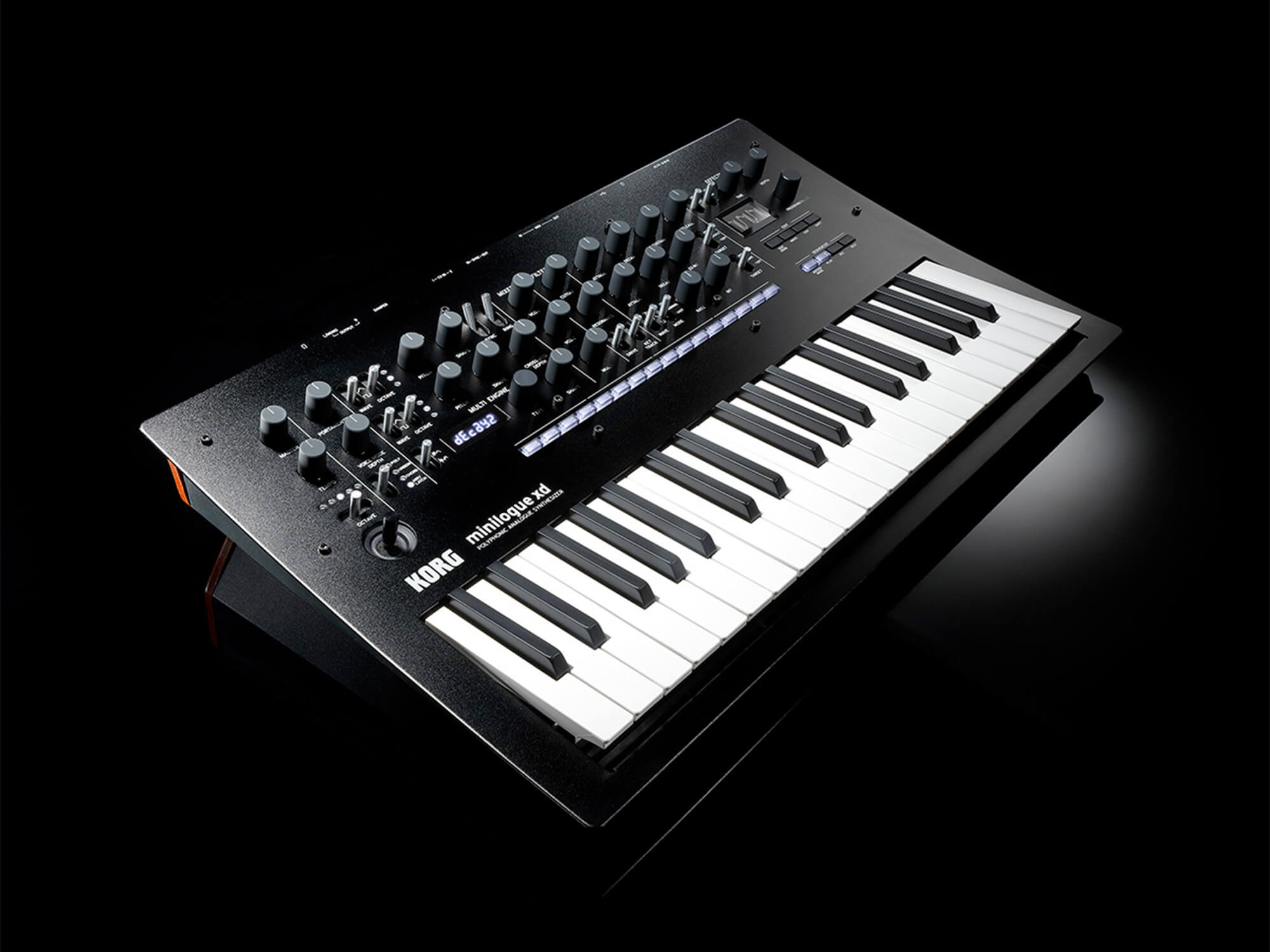
The Korg Minilogue XD matches capable specs with a sensible price tag, making it a great choice for entry-level music-makers looking to get into synthesis.
This four-voice polysynth is the successor to the Minilogue and offers the same two analogue voltage-controlled oscillators, but adds a third digital one (with noise, vpm and 16 user programs) for more sound design flair.
Onboard, there’s also myriad delay, mod and reverb effects, four operating modes (poly, unison, chord and arpeggiator) and, to round it off, a neat joystick controller for pitch bend and modulation depth.
Features:
Price: $730
Synthesis type: Subtractive, FM, wavetable
Polyphony: 4 voices
Keyboard: Slim keybed, 37 keys
Effects: Chorus, Phaser, Flanger, Delay, Reverb, Ensemble
Other I/O: 2x 1/8” (CV in), 1/8” Sync in, 1/8” Sync out
Read our full review here. Learn more at korg.com.
Today’s best deals on the Korg Minilogue XD
Waldorf Quantum
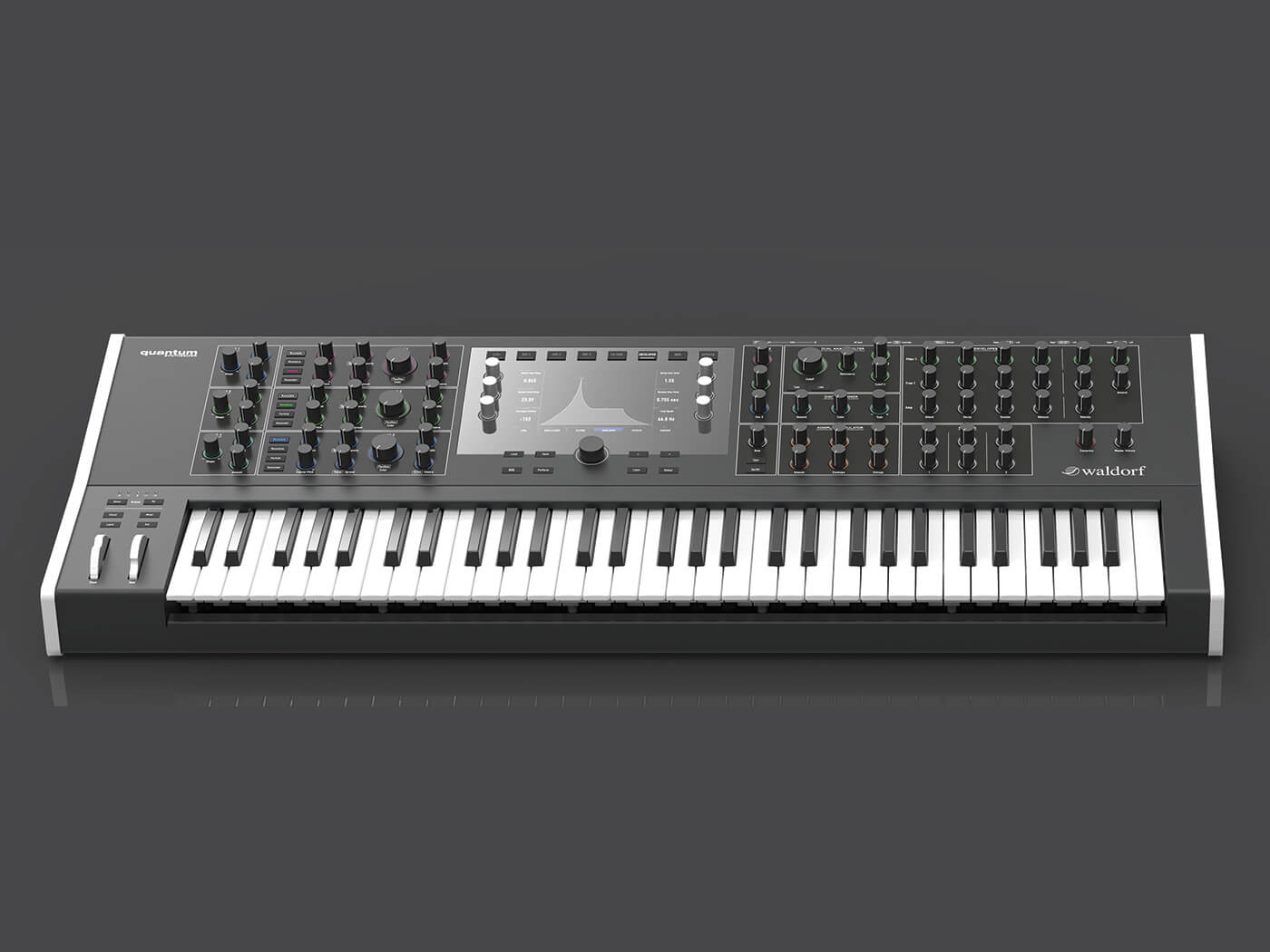
A sound designer’s paradise, the Waldorf Quantum is a digital-analogue hybrid synth which offers eight voices of polyphony, each with three oscillators that can be run in wavetable, granular, subtractive and resonator modes.
A well-designed user experience paves the way for deep sonic exploration. Clearly marked sections denote oscillators, LFOs, filters, modulators, effects and more, plus, each parameter change is reflected in a crisp touch-screen display, showing you exactly how you’re affecting the signal. Other features include an arpeggiator with seven algorithms and sort orders and a step sequencer with parameter automation, quantisation and more.
The Quantum succeeds at empowering music-makers creatively; for how advanced it can get, it manages an easy-to-follow user experience.
Features:
Price: £3,500/$6,200
Synthesis type: Wavetable, granular, subtractive and resonator
Polyphony: 8 voices
Keyboard: Fatar keybed, 61 keys
Effects: Phaser, Flanger, Chorus, Reverb, Drive, EQ
Read our full review here. Learn more at waldorfmusic.com.
Today’s best deals on the Waldorf Quantum
Korg Opsix MKII
Korg took a leaf out of its own book with Opsix, applying the simplistic concept of its Wavestate to a new FM synth. The six-operator Opsix synth builds on the legacy of the revered Yamaha DX7 FM synth pioneer, with plenty of operator functions, filter types and modulation options.
In January, just in time for NAMM 2024, Korg unleashed a series of new releases, including the microKORG 2. Another head-turning announcement was that of the Korg Opsix MKII altered FM polyphonic synth.
Following its 2020-launched predecessor, the Opsix MKII features doubled polyphony (64 voices up from 32), a 16-step sequencer, intuitive real-time controls, OLED display, 3-stage effects, analogue-style filters, a randomiser function, and six operator modes.
Features:
- Price: £699
- Synthesis type: FM
- Polyphony: 64 voices
- Keyboard: 37 keys
- Effects: 11 filters, 30 different effects in three categories
Read more at Korg.
Modal Electronics Cobalt8
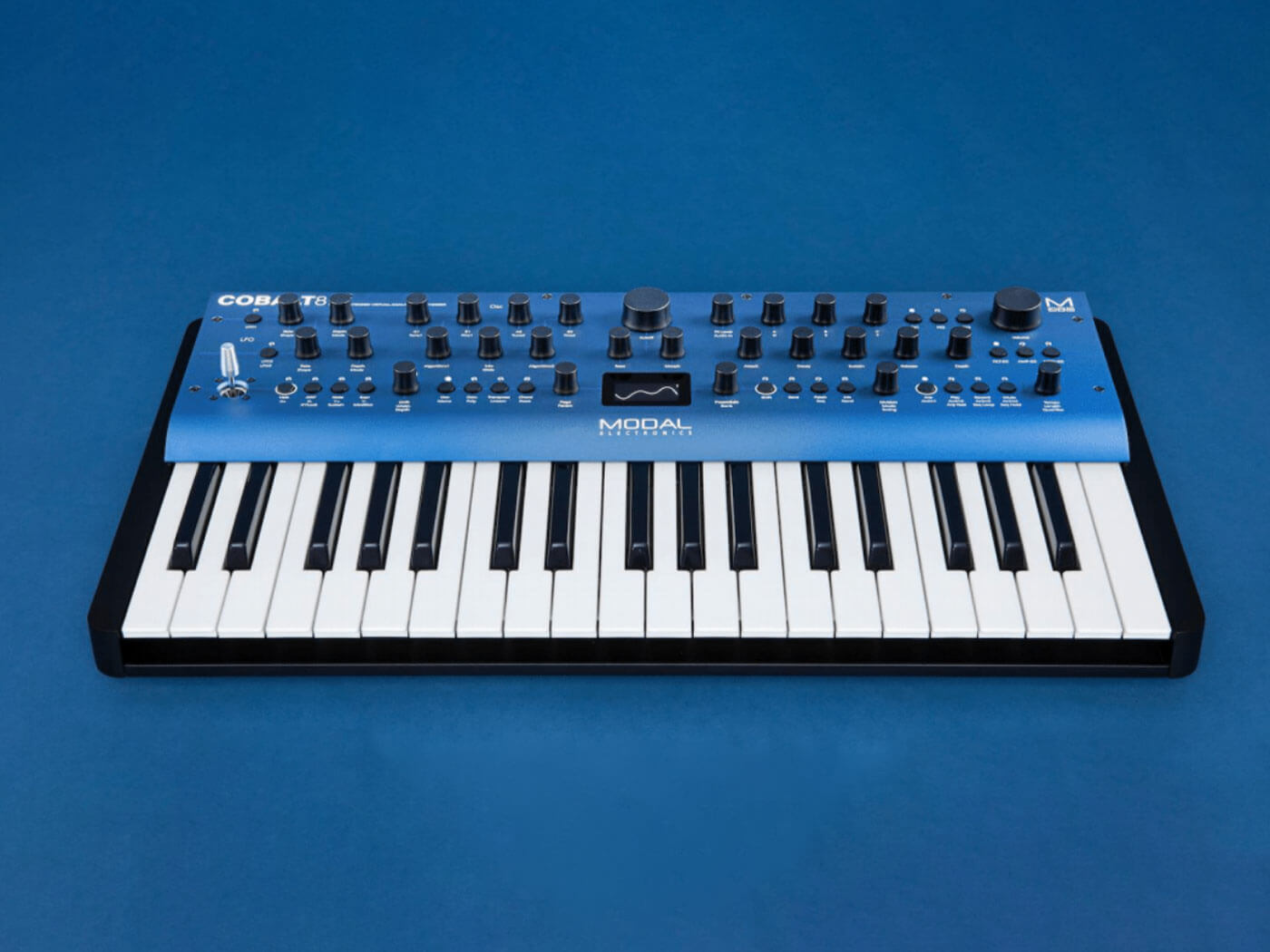
Modal Electronic’s Cobalt8 virtual-analogue series comes in three versions. The Cobalt8M is a desktop module synth; the Cobalt8 is a 37-key synth; and the Cobalt8X is a 61-key synth. All three operate in the same way, with only the keyboard size being the differentiating factor. We got our hands on a 37-key Cobalt8 and found it an extremely impressive piece of kit.
With an appealing price tag, the eight-voice subtractive synth sizes up nicely against competitors. This is thanks to its 64 high-resolution oscillators, 4-pole morphable ladder filter and plenty of modulation routing with three envelope generators and three LFOs. There are also three effects engines to polish off your signal chain, and a companion app to go deeper with sound design. Whichever size you go for, you’ll be crafting luscious patches in no time.
In our review, we said: “The Cobalt series provides an incredibly deep synthesis universe. It might be a virtual-analogue design but it sounds convincingly analogue in many ways, with a satisfying complexity and sharpness that reminds us of many industry classics.”
Features:
Price: $799
Synthesis type: Subtractive
Polyphony: 8 voices
Keyboard: 37 keys, fatar keybed
Effects: Three effects engines
Read our full review here. Learn more at modalelectronics.com.
Today’s best deals on the Modal Electronics Cobalt8
Sequential Prophet-10
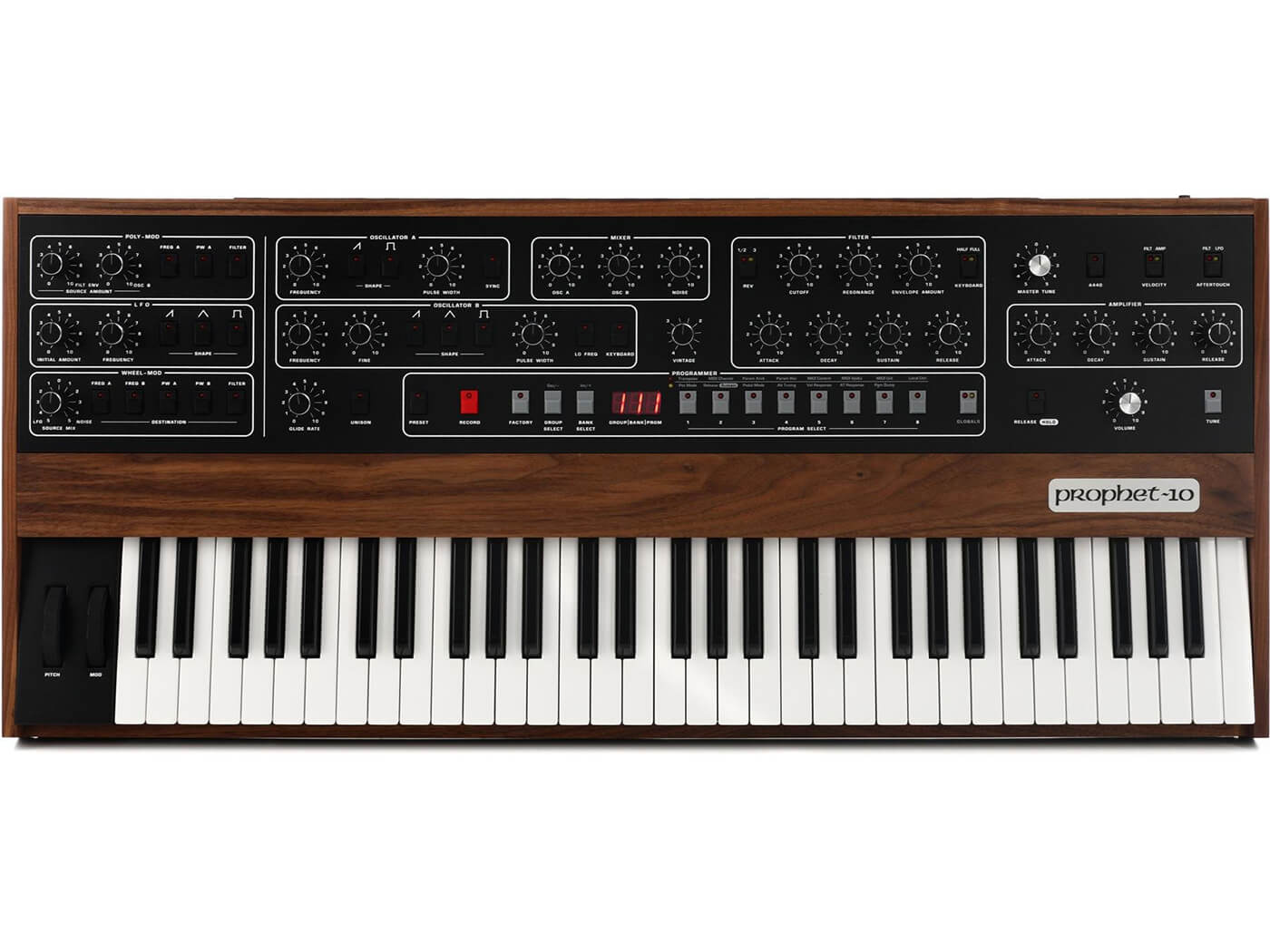
Sequential’s Prophet-10 is back and this comprehensive reboot of the iconic synth culls some of the best features of previous generations, while adding some modern ones too.
A new Rev switch lets you access the filters from the Rev 1, 2 and 3 models, while a new Vintage knob lets you rewind the synth’s sonic characteristics back in time, from the stable Rev 4 to the temperamental Rev 1.
In our eview of the Prophet-10, we said: “The Prophet-10 is an absolute joy. It sounds warm, fat, lush but, above all, effortlessly fantastic. Think about so many of the tricks synths rely on to capture your interest, whether it’s a slew of onboard effects or multiple synthesis personality types.”
Features:
Price: $4,399
Synthesis type: Subtractive
Polyphony: 10 voices
Keyboard: Semi-weighted Fatar keybed, 61 keys
Other I/O: 2x 1/4″ (CV in/out), 1x 1/4″ (gate in/out), 1x 1/4″ (release)
Read the full review here. Find out more at sequential.com.
Today’s best deals on the Sequential Prophet-10
Elektron Analog Four Mk II
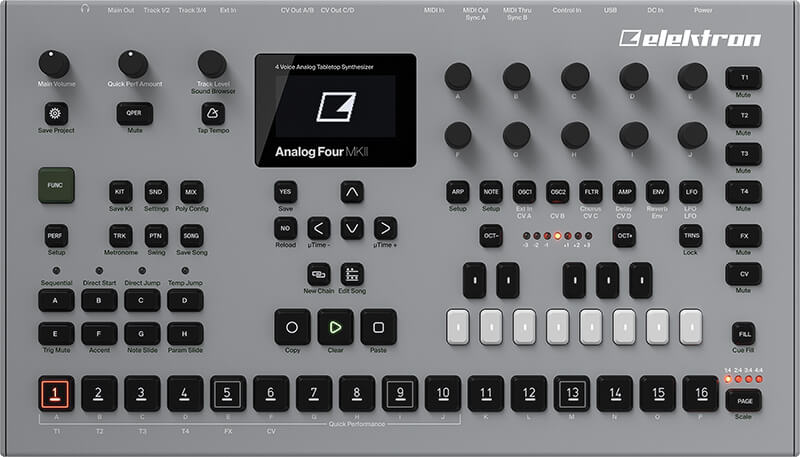
Robust and designed to play well with others – thanks to CV ins-and-outs – the Analog Four MK II can be deployed as part of a larger system or on its own. This four-voice analogue synth comes with a built-in sequencer, arpeggiator, and reverb, chorus and delay effects.
The A4 lets you assign up to four notes to a voice, where each voice is made up of two oscillators and a sub. A popular on-the-go rig these days also pairs the A4 with the other Dark Trinity boxes from Elektron: the Analog RYTM, Analog Four and Octatrack. With these, you’re covered from beats to synths to samples.
Features:
Price: $1,499
Synthesis type: Subtractive
Polyphony: 4 voices
Keyboard: Single octave trigger keypad
Effects: Reverb, Delay, Chorus, Overdrive
Other I/O: 4x 1/4″ (CV/Gate out)
Read our full review here. Find out more at elektron.se.
Today’s best deals on the Elektron Analog Four Mk II
Behringer DeepMind 12
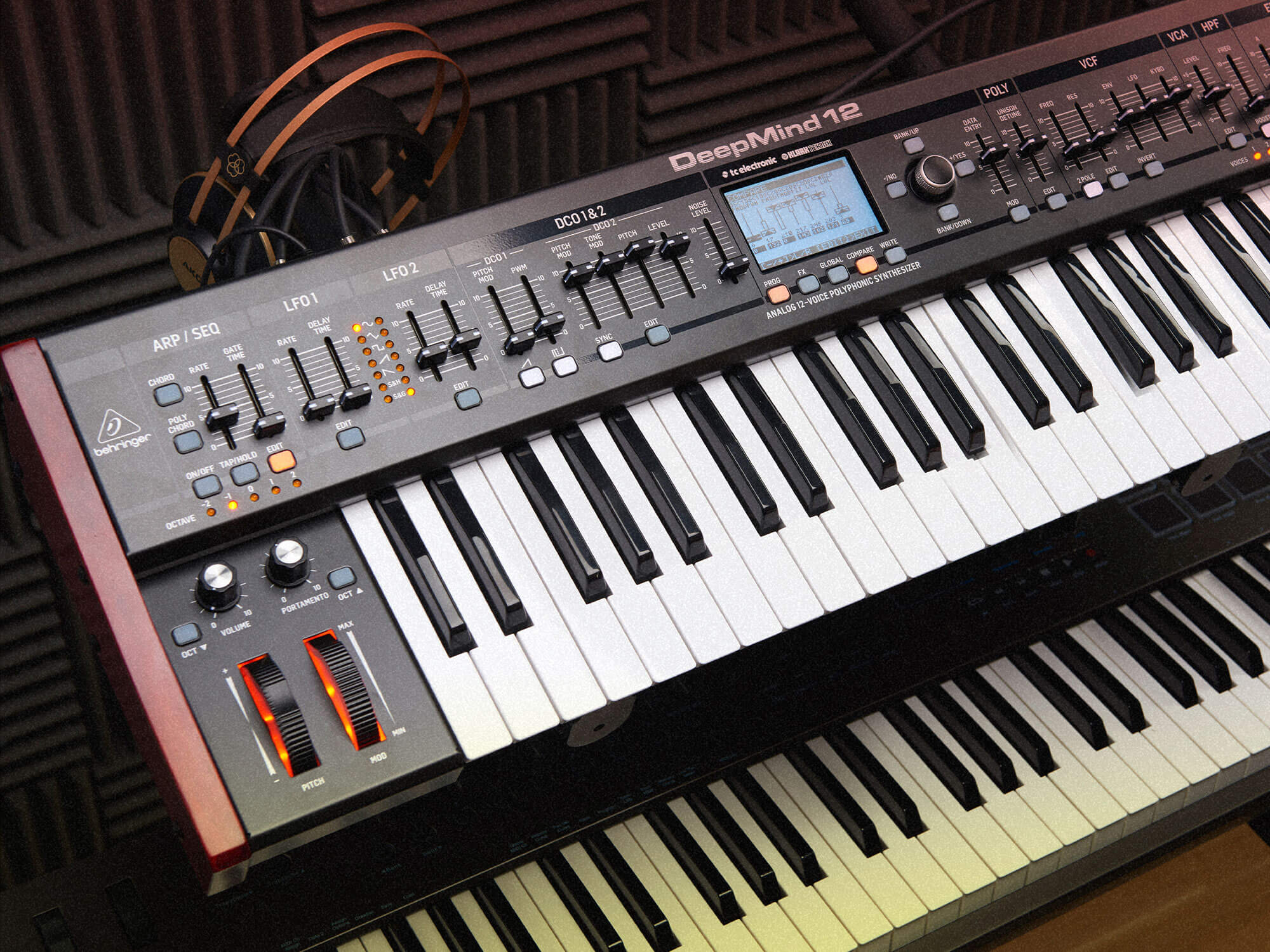
When not making accurate emulations of classic synths, Behringer does come through with some lovely unique items. DeepMind 12 is one of those.
The Behringer DeepMind 12 is celebrated for its affordable price tag, yet it doesn’t compromise on quality or features. With its vast array of oscillators, filters, and modulation options, it offers endless sonic possibilities, making it a go-to choice for both beginners and seasoned synthesists.
Key Features:
- Price: $798
- 12-voice polyphony
- Two DCOs per voice
- 24 oscillators
- Classic analogue filters
- Extensive modulation matrix
- Built-in effects
Today’s best deals on the Behringer DeepMind 12
For more buyer’s guides, click here.
